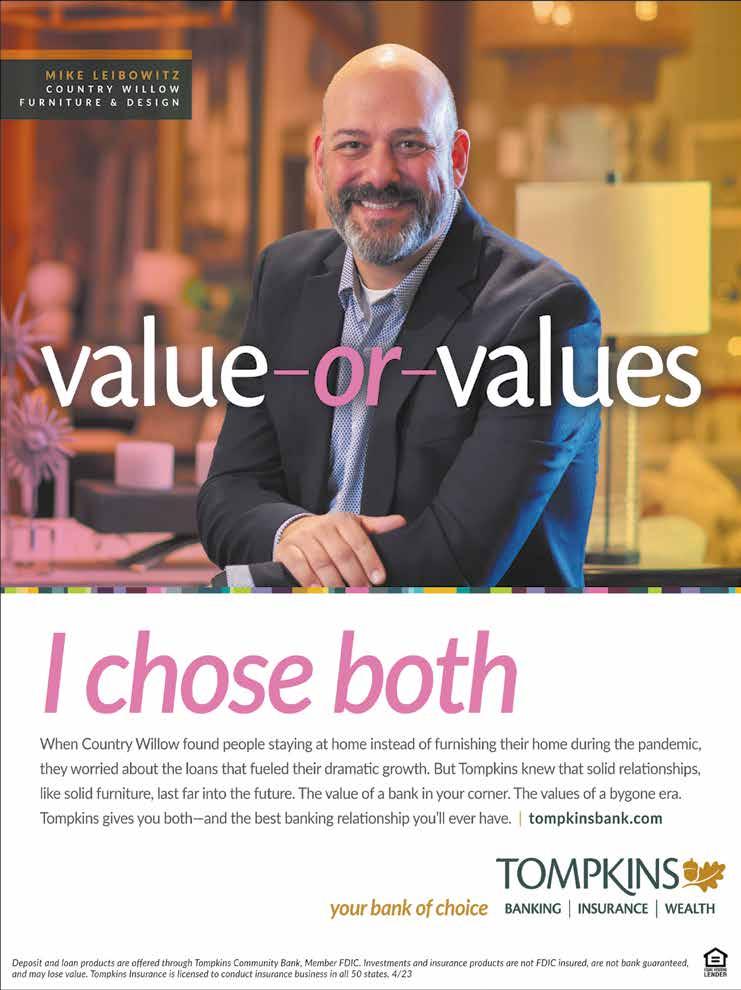




























earch the word “survivor” in a dictionary and the top definitions are fairly black and white. Simply put, a survivor is described as someone who remains alive after coming close to death. Keep reading and you’ll find a bit more depth; survivors carry on despite hardship, cope well with difficulties and persevere through trauma.
If you’ve been a survivor, or love one, you understand that words alone cannot capture the entire complex journey. Dictionaries paint a very lonely picture, but survivors desperately need a strong support system to persevere. Survivors are not simply people who cope well with adversity, they have access to healthcare. As a co-founder of Hope for Heather, committed to raising awareness about ovarian cancer in honor of my daughter, I’ve seen too many potential survivors fall through massive gaps in care.
Women who cannot get regular checkups with doctors, often minorities, are far less likely to learn about or discuss their symptoms. Women in rural communities are often forced to travel long distances to see specialists for effective treatment. Women who do not have a loving caretaker at home struggle to keep up with medication, appointments, meals and much-needed rest.
I created the Teal Circle of Women (TCOW) this year to expand Hope for Heather’s education efforts and shine a light on healthcare disparities through influential women in our community. Within just a few months 30 women joined the circle. Many are small business owners, as we believe small business is truly the backbone of our community. Visit some of our Teal Circle partners, including Fashion Rescue 911, CellaV Boutique, and Studio 663 (just to name a few) and you will readily find our ovarian cancer symptom cards and other information to take home and share.
By harnessing the power of all women, we can save lives and move mountains. Hope for Heather’s Teal Circle women come from a variety of backgrounds, but share a commitment to making a difference in our community.
Tawn Lombardo runs TMDC Dance Studio. Her Christmas Dance Show raises funds for Hope for Heather through her students, who learn about the mission, the importance of good health and giving back. Each year, a graduating senior is given a dance scholarship in Heather’s memory. This is a great example of the Teal Circle at work.
Alyssa Blazina is our Teal Circle of Women ambassador and a key player in launching TCOW. Alyssa is president and CEO of BizHub CNY, a mover and shaker and a DO-er. Alyssa helps area businesses and loves to give back in creative ways.
Jennifer Savastino, owner of Gannon's Pest Control, is a supporter of Teal Circle and Hope for Heather. Jen knows the power of women in our community and uses her voice to elevate our cause.
Letizia Pinkel uses her voice through music. Letizia is our music ambassador and supports us through her music events with the Z Band. Letizia plays Hope for Heather's teal guitar several times a year and speaks from the stage about the importance of education and ovarian cancer.
The Teal Circle is a partnership between Hope for Heather and women in business who will use their voices to share our education and awareness mission. We ask our members to have symptom and education cards at their place of business, to volunteer and assist at events, to help find event sponsors, and give us a bigger voice in the community. There is no financial expectation. Our mission is to save women's lives from a terrible disease. Survivors need support, access to healthcare, and hope. We are powerful and strong when we stand together.
Frieda Weeks is the president of Hope for Heather, an organization named for her daughter whose mission is to raise funds to support ovarian cancer research, to promote education and awareness, and to help to provide comfort to women and their families devastated by cancer.
SyracuseWomanMag.com
contact@ syracusewomanmag.com
PUBLISHER
David Tyler
dtyler@eaglenewsonline.com
DESIGN
Andrea Reeves
PHOTOGRAPHERS
Alice G. Patterson
Chef Eric Rose
CONTRIBUTORS
Rob Bick
Janelle Davis
Alyssa Dearborn
Kate Hanzalik
Jason Klaiber
Norah Machia Maeve Nesci, M.S.T. Chef Eric Rose Frieda Weeks
Cover photo by Alice G. Patterson
Renée Moonan Linda Jabbour 315.657.7690 315.657.0849
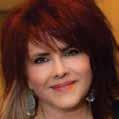
Rmoonan@ eaglenewsonline.com Ljabbour@ eaglenewsonline.com


Unlike any other publication in the Syracuse area, our feature articles address major topics that interest local women. Each issue includes articles on health, fashion, fitness, finance, home matters, dining, lifestyle and personal perspectives, as well as a spotlight on local Syracuse women. Ads are due on the 15th of the month prior to publication. The print magazines will be distributed locally in over 350 locations and will be in your inbox electronically by the middle of every month.
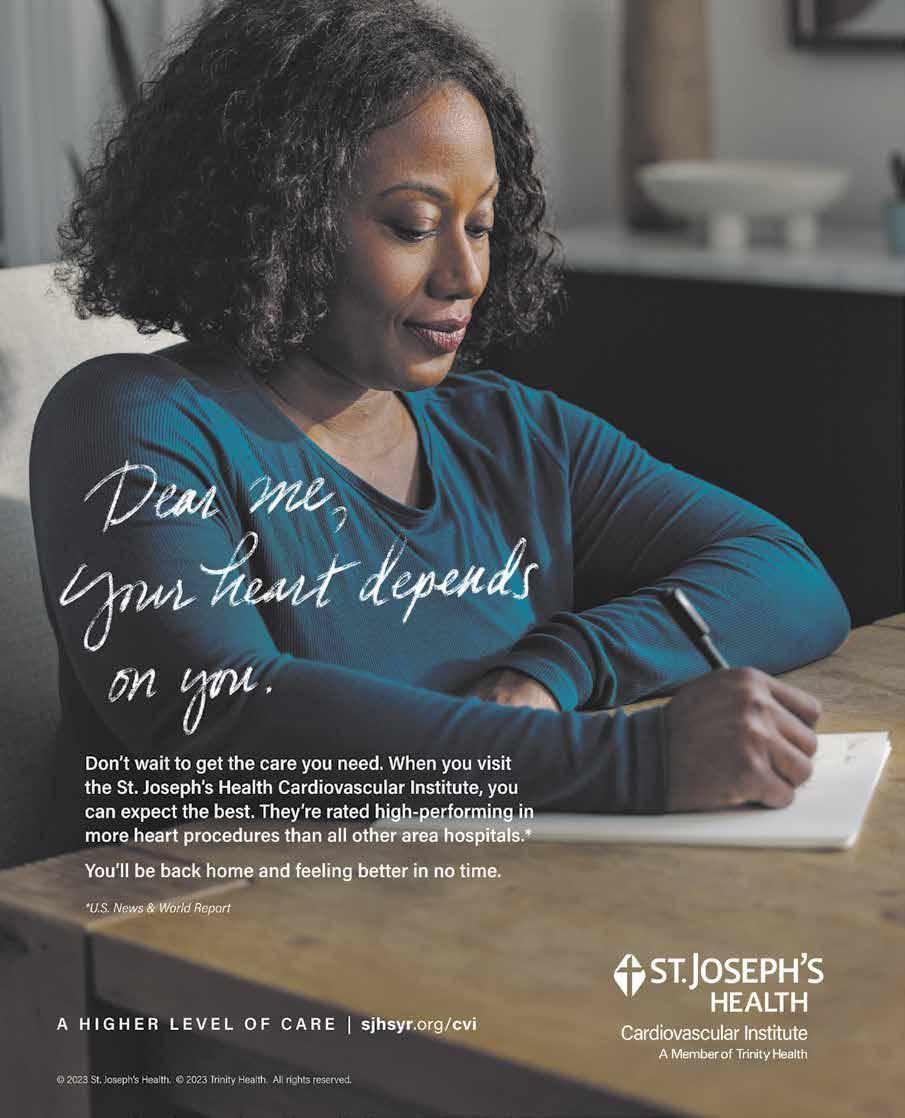
The publication is available free of charge.
CONTACT OUR HOME OFFICE
315.434.8889 | 2501 James Street, Suite 100, Syracuse, NY 13206
The magazine is published 12 times a year by Community Media Group, LLC and Eagle Publications 2501 James St., Suite 100 Syracuse, NY 13206
Copyright © 2023 Community Media Group, LLC. No part of this magazine may be reproduced or republished without the consent of the publishers. Syracuse Woman Magazine is not responsible for unsolicited submissions, manuscripts, photos or artwork. All such submissions become the property of Community Media Group, LLC and will not be returned.

Having worked in the notfor-profit field for her entire professional career, Sara Wall Bollinger has come to appreciate the passion and selflessness intrinsic to the many organizations looking to fulfill social goods without financial gain.
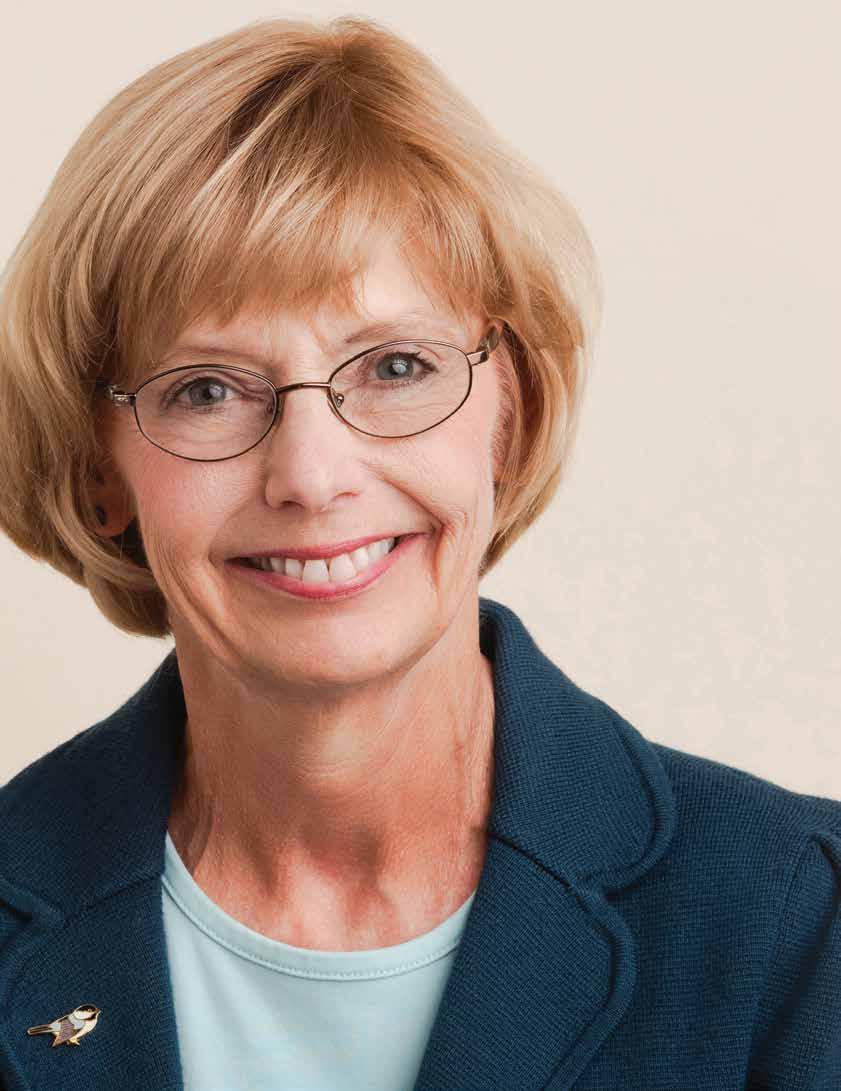
With her business SWB Consulting Services, which takes its name from her initials, Bollinger has made it her mission to take that passion and purpose and have those nonprofits incorporate her recommendations for how to improve on the strategic front going forward — all while zeroing in on the places where the volunteers’ individual skills and natural talents can shine best.
Vexing obstacles faced by these organizations often include division among a board of directors, dealing with unforeseen resignations and the resulting vacancies, bolstering a program or fundraiser that isn’t gaining enough traction with the public, issues related to hiring or training, and an impasse with how to approach grant writing, she said.
“That’s where there’s a barrier at times,” Bollinger explained. “People can just feel intimidated by the grant writing process, and by getting through it a couple times people then feel more confident and they’re able to move forward.”
Sometimes, Bollinger said, it can just be the need for outsider to bounce ideas off of who can provide some
• Sara Wall Bollinger officially got her business SWB Consulting Services going in 2015. The service is a certified New York State woman-owned business enterprise.
• Bollinger is also the deputy supervisor for the Manlius Town Board, an appointee to the town of Manlius and village of Fayetteville comprehensive plan steering committees, and a member of the Onondaga East Chamber.
• For her consulting service, which takes on not-for-profit agencies as its clientele, Bollinger draws from her own decades of experience as a leader for nonprofits.
helpful creative input, organizational tips, and enterprise-wide or innerdepartment planning suggestions to make a desired future a reality.
“You could expect most nonprofits to be facing the same kinds of challenges and experiencing the same kinds of opportunities,” she said. “By having worked in a number of different organizations as a staff member, as a director and also as a volunteer board member myself, I’ve seen how a lot of different organizations work and can assist my clients with things that they may anticipate coming forth because they’re pretty common in the not-for-profit arena. It’s about how people can strengthen themselves to be ready to do all of the wonderful things that they would like to do.”
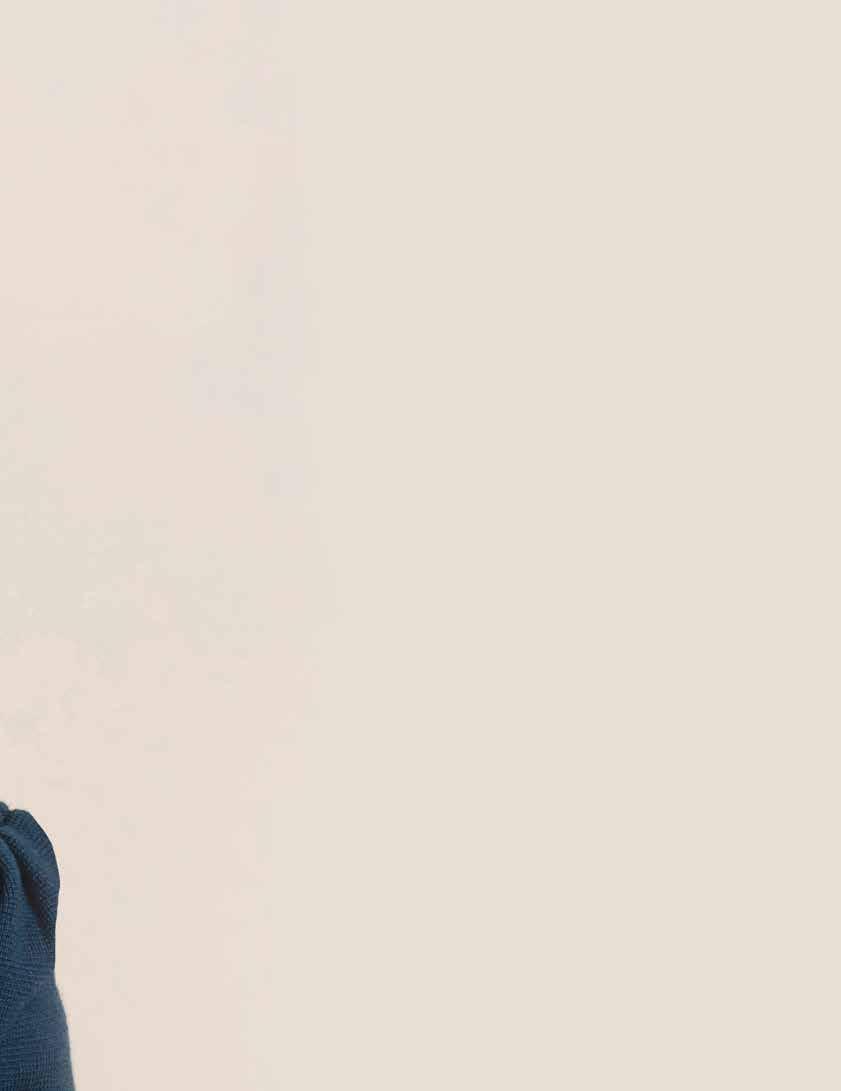
Bollinger officially entered the consulting world in 2015, already equipped with decades worth of experience when it came to nonprofits.
By that point she had spent over 20 years — from 1991 to 2012 — as the executive director and CEO for Enable, an agency devoted to helping people with physical and developmental disabilities. That organization would coincidentally end up combining with Transitional Living Services of Onondaga County, a not-for-profit she had previously worked for that was based around residential supports and mental health recovery, to form AccessCNY in 2013.
At Enable, Bollinger got wise to the ins and outs of business development and how to accomplish growth as an organization, putting that knowledge to action as seen by the agency’s considerable expansion under her leadership.
“We got to experience some of those growing pains and also some of the challenges in the good way as far as taking advantage of opportunities as new funding, new geographic areas, and new program lines became available,” Bollinger said. “I figured out how you make the decisions about which programs to pick up and which ones maybe not to do, and how to integrate new programs into an existing organization.”
Bollinger was also the executive director for health planning with the advocacy organization pushing for quality and accessible healthcare HealtheConnections and the president of the nonprofit seeking to improve the well-being of rural communities, the New York State Association for Rural Health. However, she makes clear that SWB Consulting Services ventures into all sectors of society and not just the traditional healthcare realm, allowing her to work with animal caretakers, veteran-empowering organizations, historic associations, and environmental groups too.
Now, with almost 10 years at the helm of SWB Consulting Services, Bollinger has gained even more experience by virtue of the day-to-day takeaways that come with pulling such a range of organizations out of their binds.
“Every single new organization, I have to learn something about, so it has certainly expanded my horizons and understanding of all the things that good not-for-profit organizations are doing in the Central New York area,” she said.
Based in Fayetteville, the village in which Bollinger lives, SWB Consulting provides assistance throughout Upstate New York as a designated New York State woman-owned business enterprise, stretching its services to the North Country, the Southern Tier and even Buffalo, though going so far west within the state is atypical for her, she said.
“I do feel because of the technology to permit virtual work that I have been successful in working with clients of a much bigger geographic area than would’ve been feasible if we only had in-person,”
Bollinger said. “When there’s a big meeting or a retreat or an analysis of some sort, I will travel to the client’s business.”
Though her business underwent only a slight “hiccup” during the onset of the COVID-19 pandemic due to its established virtual structure and her selfemployment, Bollinger spent the better part of the past three years showing certain nonprofits how to adjust, regroup and refocus on their biggest priorities through the potentially upending circumstances. As the nation has come out of the height of the pandemic, she’s started to see charitable businesses become eager to plan things out again and return to the goals they thought they were going to check off in 2020 but were forced to put off indefinitely.
Despite the similar brick walls that can arise, each client has its own unique needs. Her consulting process involves up-to-date fact-finding, background research and slideshow presentations containing useful advice as well as interactive brainstorming, surveys and listening sessions with the groups that enlist her help.
“People’s needs change across their lifespan,” Bollinger said. “There are generational changes and technological changes, but the more we can be in front of that and catch onto what is needed by the customers or by the residents in the case of the community, we can always be filling the needs that people identify.”
In tandem with the other roles she juggles as the town of Manlius’ deputy supervisor and as a member of the comprehensive plan steering committees for both the town and the village of Fayetteville, Bollinger’s overarching goals have been to make services to the community as effective as possible and remain responsive to what people are looking for in their surroundings. She added that those separate roles inform her consulting business because they foster an understanding of how to collaborate side by side with people who have disparate interests in the ultimate search for common ground.
SWB Consulting Services offers free consultations, letting Bollinger go over what an organization’s requests are before tailoring a proposal to their needs. At the end, she makes sure to supply each nonprofit with a written report that they can keep as a reference to go back to over time.
“Most not-for-profits’ boards of directors have terms of office, so the people who wrote a plan may have termed off by the time you’re into year three or four,” Bollinger said. “I think it’s valuable to have a written record with some pointers so that new board members coming on can understand what the thought process was that led to the plan they’re working on.”
Named a Woman of Distinction in 2022 at the 10th annual award ceremony held by Assemblyman Al Stirpe to recognize women based on the cumulative difference they’ve made and not just a single achievement, Bollinger also belongs to Women Business Opportunities Connection (WBOC), a Syracuse organization meant to fuel the success of local women entrepreneurs by nudging them to network with each other and possibly even do business with one another if they see fit.
She joined the supportive resource about 15 years ago and has developed an appreciation for the diversity of membership, the engaging monthly presenters, and the overall positivity it puts out there.
After a decade spent building up her business, Bollinger thanks the mentors who have helped her to carve her path in the world and the colleagues she has brought into the fold to lend a particular skill or perspective for her consulting endeavors, a good amount of whom belong to WBOC like she does.
“It’s important to know that none of us succeed alone,” she said. SWM For more about SWB Consulting Services, visit swbconsultingservices.com.

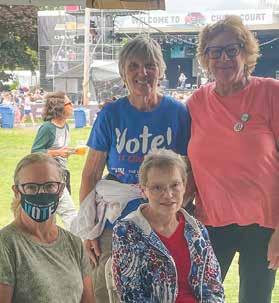
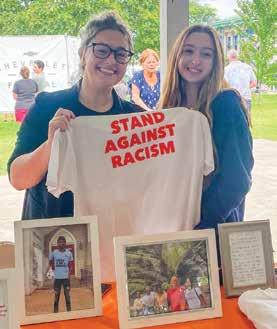

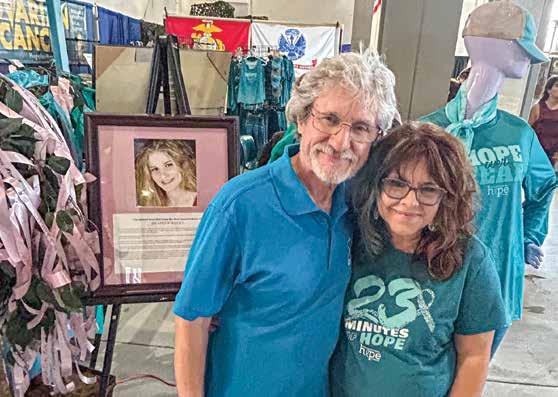
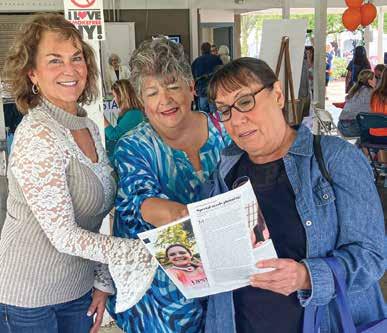
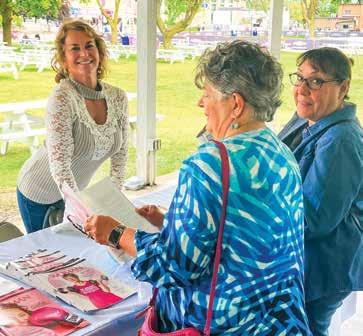
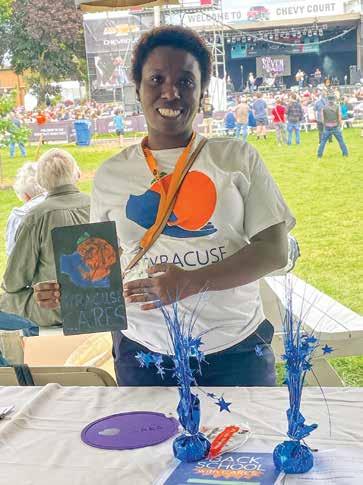

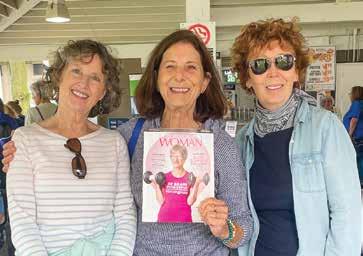
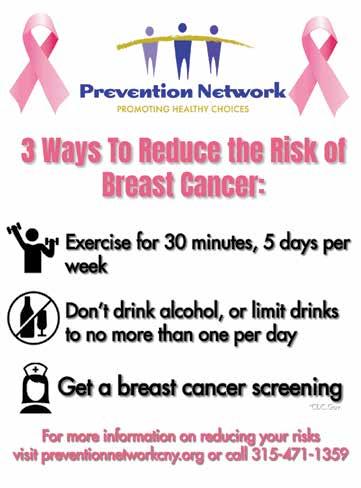
From Sept. 8 to 10, The Baldwin Fund held its first annual Pickled Pink Pickleball Tournament at Lysander Town Park Pickleball Courts in Baldwinsville. Sponsored by Byrne Dairy, 100 percent of the profits went to benefit cancer research, raising more than $5,000. For more information, visit BaldwinFund.org.


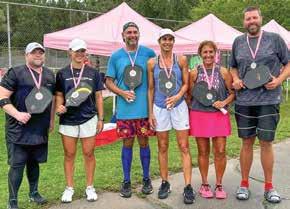
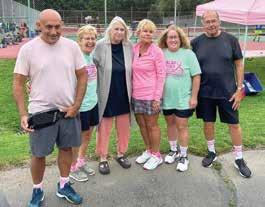
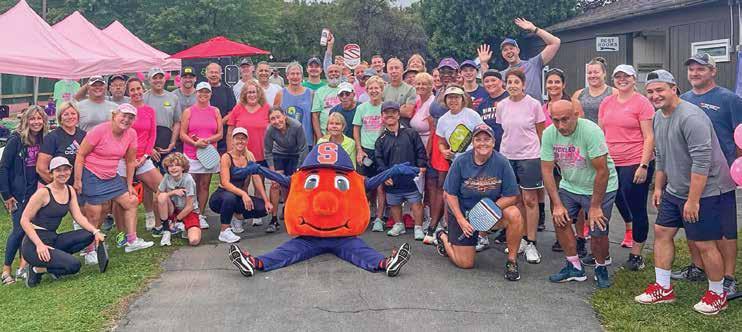
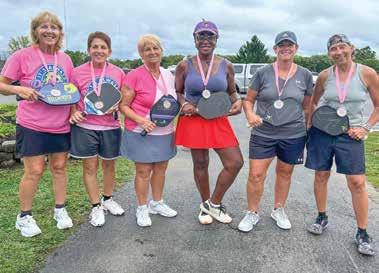
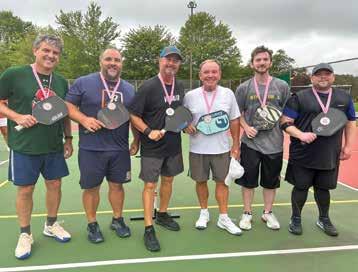

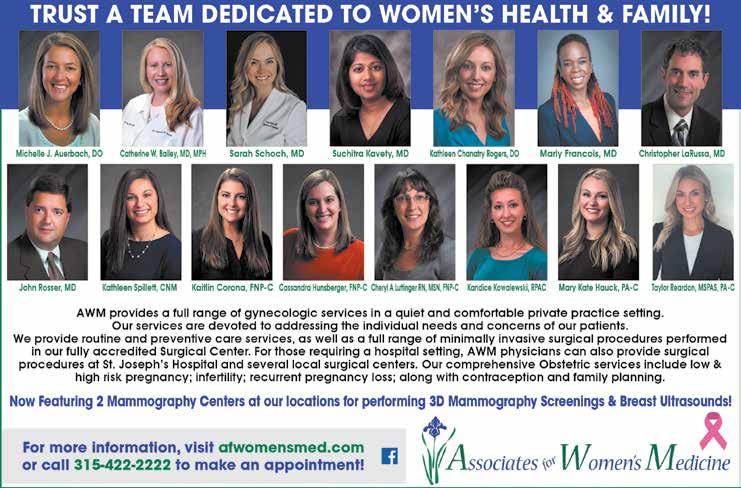
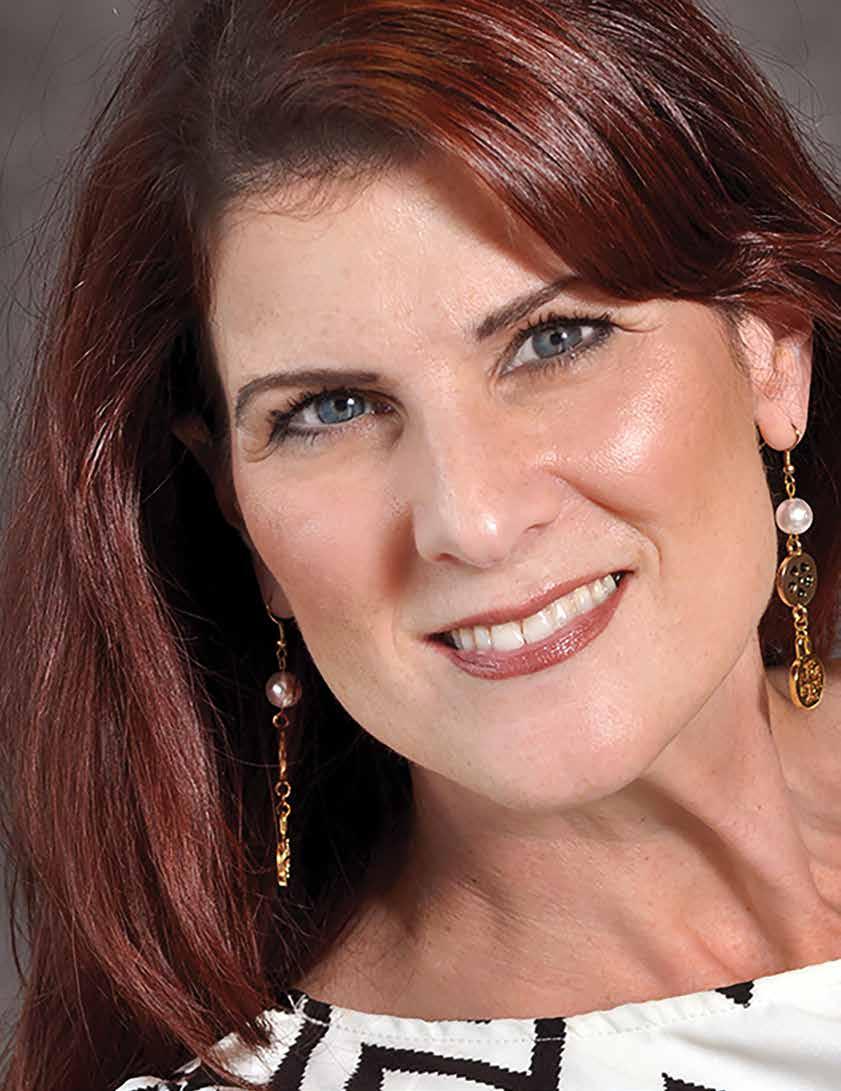 Rob Bick
Rob Bick
“Tragedy brings out the best and worst in everybody. People surprise you, and you find out what they are made of.”
—Ann Marie Bick
Syracuse Woman Magazine, October 2014
It has been almost five years since my beloved wife, Ann Marie, passed away. It feels like five seconds ago that I was holding her when she took her last breath. It feels like 50 years since I have looked into those piercing blue eyes. It is September 7th as I sit down to quantify some thoughts on the passage of time and the evolution of grief and assimilation to a different reality. The date “the 7th” holds special meaning to me. We met on a 7th day, we were married on the 7th day and she died on the 7th day, so doing this today is appropriate.
Many of you know Ann Marie’s story. A former model, an owner of a modeling and talent agency, a champion of many causes, a public speaker and a cancer survivor from the age of 39. She was witty, smart, hardworking and beautiful. She was diagnosed with metastatic breast cancer, a terminal diagnosis, in 2013. I had met her 5 months earlier. She lived five and a half years, not the 24 to 36 months originally projected. She did extraordinarily well for four of those years. The last year and a half … a nightmare.
I firmly believe that at the moment of her diagnosis I started to grieve. I believe this is called “anticipatory grief.” I had lost both my parents to cancer. My father, the Marine, was diagnosed in 2000 at the age of 62. He looked 50. When he died in 2005 he looked 90. A big guy completely depleted by cancer. My mother died in 2008 after a six-week battle with a Stage 4 glioblastoma. She didn’t even know what hit her. No one had time to prepare. She was never sick a day in her life, and we thought she would live to be 100.
So yes, while I knew Ann Marie was sick. She didn’t look it, act it or live like it. “Live like you’re living” as opposed to “Live like you are dying,” was her creed. I figured that I was heartily battle tested in the trenches of cancer warfare, and we would find our way through this. What I didn’t realize at the time was with the endless financial problems left behind by my parents and an estate with years of loose ends, I had not spent the time necessary to properly grieve the loss of them. I struggled mightily, but silently, with Ann Marie’s illness, and I was operating out of character for a time.
Dealing with existing unattended grief and fresh new grief was challenging, to say the least. As someone who does not drink or do any drugs (besides Advil after a morning in the gym), I don’t self-medicate. Thus, I faced the grief and its complications head on, as I do now, knowing that some days I will blink and some days grief will cower in the shadows because I won’t blink. I did make mistakes, but realized that if you don’t face it, you will not make it. Simple concept, yet a complicated process. One can dance with the five stages of grief in a brief five minutes, so the methodical nature of that clinically outlined process seems more psychobabble than reality. It will be different for everyone.
The surreal process of grieving is unique to each individual. Like raising children, no manual is issued. It is not easy to return to an empty house at the end of the day, one that was filled with joy and life. To coin an old phrase: The silence is deafening. I think I slept in a recliner for three months, not wanting to go back upstairs to the master bedroom. All her belongings, clothes, decorations in the house, etc. were an endless painful reminder that this is all I had left of this amazing person. At least that is what you feel in the moment, and it is very real and very suffocating. To be harsh, I felt like I was left with a fist full of ashes. The question that kept slapping my skull like a boomerang was: Did I do enough? What else could I have done?
Thankfully I had Ann Marie’s family dog Coco, the really old Shih-tzu. He was my best friend for a year. I took him everywhere with me. No doubt he was feeling the loss as well. He passed away quietly in his bed in the sunroom the very day that my lawyer handed me the letter that officially closed Ann Marie’s estate. I guess she needed him more than I did. Talk about irony, right! Big guys and Shih-Tzus could be a reality show, just like "Pit Bulls and Parolees."
Along with surreal process of grieving, you can add the complicated process of dealing with a deceased individual’s estate, a severe encumbrance to meaningful grieving due to the U-Hauls full of paperwork that come your way for various and sometimes sundry purposes. Every time you have to mail out a death certificate, it seems feels like adding insult to injury. “How can this be real” is a common utterance, as well as some other choice and meaningful words. I went through it with my parents’ estate for years, so I thought I was ready for the tribulations to come. Yet losing your wife is a completely different animal.
As mentioned earlier, Ann Marie started and owned a very successful business, AMS Models and Talent. Two days before she died, our attorney had to come to the hospital to have the business officially signed over to me for purposes of continuation. A very sad moment in my mind. At that time, I think she knew her days were limited. She had tried to sell it but had no legitimate offers.
This was quite the challenge for me, to say the least. I had to get up to speed on the business process. She had people working the day-to-day aspect of it, and I felt an obligation to keep it going for a year at least to ease any type of transition for the two employees and for her good name. This is where some of the issues began. Prior to her passing she had $120,000 hacked from her business accounts at a certain national bank. The bank returned $100,000, but failed to make good on their fiduciary responsibility to reimburse the remaining $20,000. She filed a complaint with the bank, and passed away before it was resolved. I had to get a lawyer and the media involved and like magic, the money re-appeared in the business account. It wasn’t that easy. I thought I would spare the details. I also had to retain an attorney to dance with another bank’s home office, a bank that had business funds they would not allow me, the corporation owner, to transfer to new business account, even with a death certificate and the documentation that I now owned the business. They lost as well. I firmly believe that after this, after all the media accounts of the wrongdoings of large banking corporations nationwide and the accompanying tens of billions of dollars of fines, that “Big Banks are Domestic Terrorism.” I dare you to prove me wrong.
Then there was dealing with her leased car. In short, this manufacturer should have hired a better lawyer to write their lease rather than spewing requirements that were not written in the lease. Maybe they ought to read their own paperwork on occasion. I know, too much work … just don’t question it and give us money! That deserves an “lol”.
Bottom line, most people will help you. However, some say they want to help you, but don’t believe it. You will learn who they are. They want the revenue, plain and simple, and will torture you to get it. Be strong, fight back, beat them like you would beat a dirty rug on the clothesline. They deserve it. Victories aid the grieving process, though it is a shame one must go through it to begin with.
I still own the AMS Models and Talent business, though it has not booked new work since early 2020. I have had issues with an agency started by one of her employees, who has repeatedly used AMS facebook pages and other AMS references, and essentially retitled the AMS webpage and continues to use it. This is not appropriate, so believe when I say … this business is not AMS Models and Talent.
I am grateful for so many things. One of those is health insurance. We would have been living in a tent if not for that. It was a struggle to get her on the policy originally. When she moved in as a domestic partner, the state law and the insurance company allowed her to be on the policy.
My employer did not allow it. They did not have a written policy and made an arbitrary decision to not allow her to be added, most likely due to her cancer. It cost us $17,000 in the six months prior to our marriage, when they had no choice but to put her on the policy. On the other hand, I was given all the time I needed for doctor’s visits, hospital stays, etc. What can I say except that government in general is “behavioral irrationality” at its’ best.
All this was very challenging throughout her illness and continued to be challenging after her passing. We had an amazing relationship, and that made the insurmountable mountain of cancer and the aftermath a bit less daunting to navigate. Not much, but a bit. Ann Marie would marvel at the fact that we were two alphas that could co-exist and thrive under one roof. I was the quiet one. She? Those who knew her know the answer to that one. It was an honor to know her and a privilege to be the one chosen to guide her through the most difficult part of her life. We learned a lot from each other and enjoyed every moment together. She loved the family compound in the Adirondacks. I wish I could say the same about fashion shows. She learned about winter sports, design, government, the mountains and football, I learned about Christian Louboutins, the modeling business, raising good kids, mystery novels and dealing with a razor-sharp wit. Most important … I learned what it was like to have a joy of life in the face of severe adversity. The best lesson of all.
In the October, 2014 issue of this very publication, there was an article about Ann Marie and her dear friend (and mine) Frieda Weeks and their experiences with illness, loss and grief. After reading the article again years later and after Ann Marie’s passing, there was statement that struck me: “For the Weeks family it caused friends to abandon them when they needed the most support.”
The bottom line there is that you lose people along the way after someone passes. Hard times will reveal who is for real, and who will walk away. After all of this, I believe that those with character check in when the camera isn’t rolling, when they are not using it as a facebook post and when they are not required to do so as a courtesy. Those that regularly
go out of their way are the ones to be cherished. They have the big hearts and the concern for others. They become family. I must thank all these people for having the character and decency to look after someone who is grieving. Their support was priceless. They know who they are. The ones that disappeared also know. Cancer is the modern-day plague. Even though the caregiver is very aware that the person with cancer is suffering 1,000 times more, we need a boost on occasion too, especially at the end of the caregiver journey.
Good health care in the face of adversity is also imperative. The good people at Hematology/ Oncology were great and did all they could. The cancer floor at St. Joseph’s Hospital was outstanding and took care of both of us during our lengthy stays. Excellence should never be taken for granted. I wish I didn’t know them, for obvious reasons, but I am eternally grateful for their work.
In the end, the best advice I can give is not mine, but belongs to Oren Lyons, the legendary Onondaga Nation Faith keeper, who said: I thank the Creator every morning when I get up. I give thanks for this day, another day. Then you roll up your sleeves and get out there. All of our personal life stories have to be re-written at some point. If you don’t have a life, you don’t have a history. Take advantage of the time you are given and make some more history! I survived what I call the “Bermuda Triangle” of cancer, watching three amazing people suffer unmentionable sufferings and not survive. I have found an increasing degree of compassion for those in need, and a greater level disdain for those that perpetually cry wolf and the nonsense peddlers of the world. (My fulltime profession is in government, so I roll my eyes … a lot.) SWM
Rob Bick, Ann Marie’s husband, believes in community service. He is on the board of directors of the Erie Canal Museum, the town of Cicero Zoning Board of Appeals, and V.P of the NYS Assessors Association. He has served as board president of the Northern Onondaga Public Library system and has served on the boards of: CNY Chapter of the American Institute of Architects, the Adirondack Architectural Heritage Foundation, the Midstate Youth Hockey Association and did Search and Rescue work in the Adirondacks for 15 years. He has won awards in four different professions, and simply wants to live a quiet and productive life working, climbing mountains, giving back and playing in the snow (if it ever snows again.)
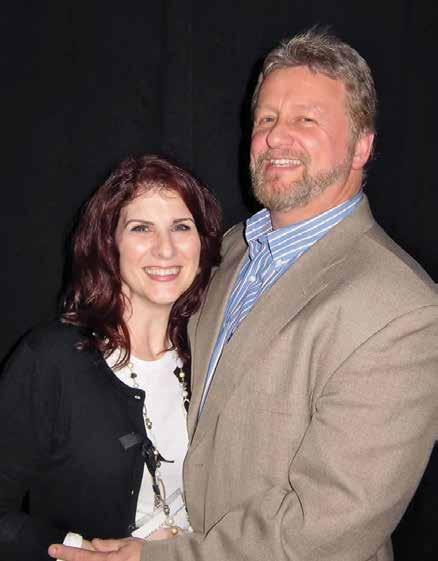
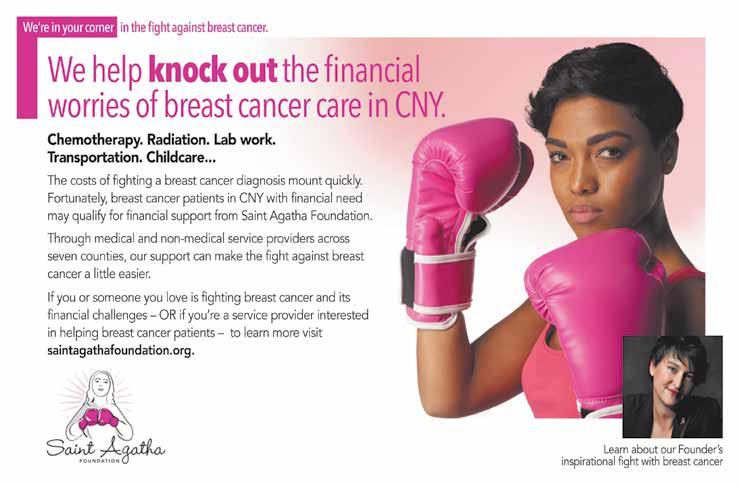
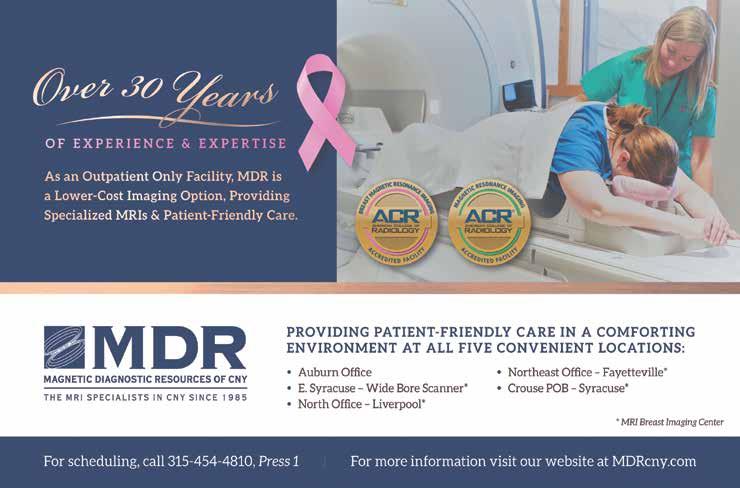
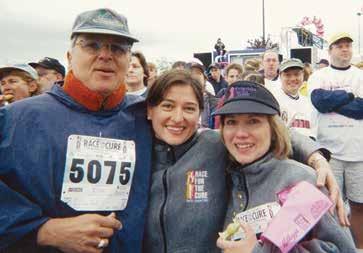
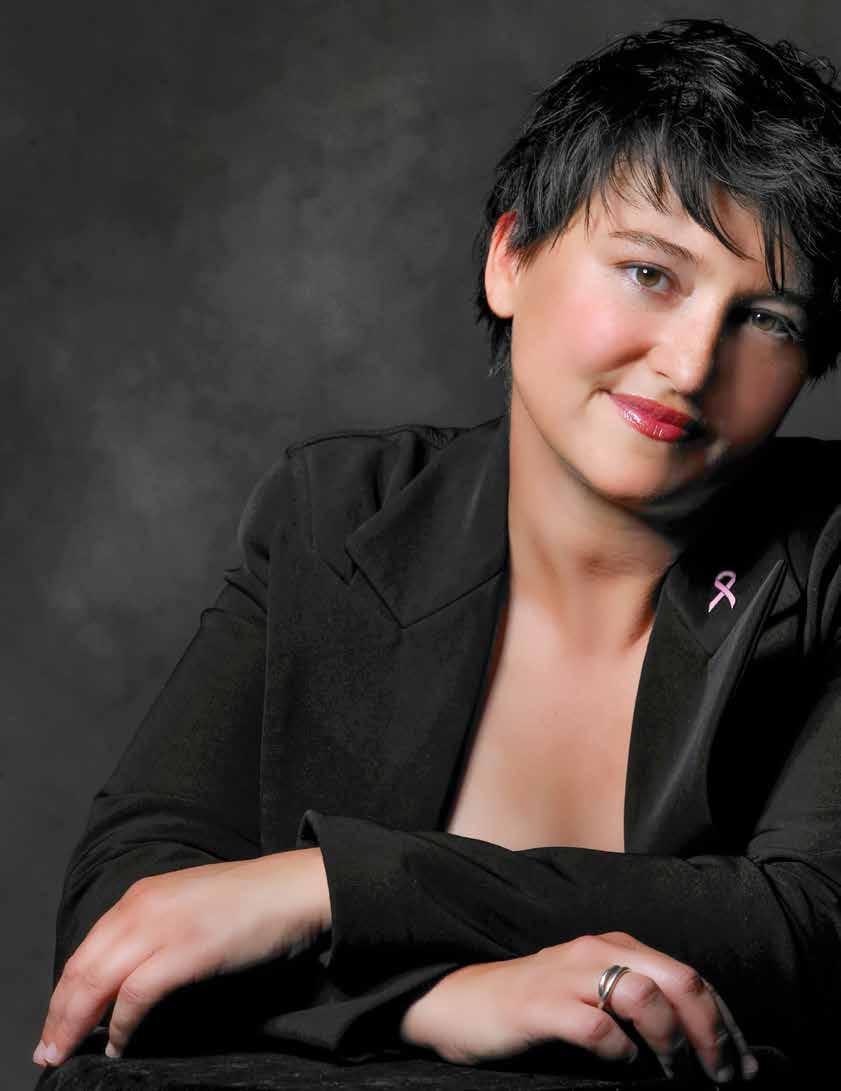 Norah Machia
Norah Machia
Kathy Mezzalingua
remembers accompanying her late daughter, Laurie, a breast cancer patient, to one of her first chemotherapy appointments.
As they waited to be called into a room for treatment, Laurie overheard another patient discussing how she was struggling to pay for her chemotherapy treatments and at the same time, cover her household expenses, including her groceries.
“After that, Laurie became very aware of other breast cancer patients and their needs,” said her mother. Her daughter, who displayed incredible strength and resilience after being diagnosed with breast cancer at the young age of 29, decided to channel her energy into helping others who were suffering financially because of their breast cancer diagnosis.
During her 12-year battle with breast cancer, Laurie’s tremendous sense of compassion and spirit of giving was reflected in her many fund-raising efforts. For six years, she was a board member of the Susan G. Komen Breast Cancer Foundation and served as president for two years. In 2005, she was honored with the national Susan G. Komen Breast Cancer Outstanding Volunteer Award.
But Laurie wanted to do even more to help breast cancer patients in the Central New York region who lacked financial resources to pay for their care. “She wanted people to have the ability to focus on their treatments, not their bills,” her mother explained.
A native of Manlius, Laurie graduated from Manlius Pebble Hill in 1986 and Boston University in 1990, where she had a double major in communications and Chinese history.
After graduation, Laurie worked as an editor’s assistant at Random House in New York City. She later returned to Central New York, and took on various roles in the family’s business, PPC, a manufacturer of cable and wireless device connectors.
Laurie became the founding president of Kajola Kristada, a subsidiary of the manufacturing company based on the island of St. Kitts. Before her breast cancer diagnosis, she already displayed a special gift for helping others, by working with her family to start building a new school on the island for students in kindergarten through 11th grade, and to offer tuition assistance to low-income families.
So it was no surprise to Laurie’s family and others who knew her well that she decided to establish her own foundation to help breast cancer patients pay for their treatments and other expenses.

In 2004, Laurie established the Saint Agatha Foundation to provide support, comfort and care to breast cancer patients through financial assistance programs. The St. Agatha Foundation partners with local hospitals and agencies to financially support breast cancer patients in Onondaga, Cortland, Cayuga, Madison, Oneida, Oswego and Jefferson counties.
“Laurie was remarkable,” said her mother. “She managed to turn her diagnosis into a good thing by helping others.” While the St. Agatha Foundation assists patients with the medical costs of breast cancer treatment, it also provides support for non-medical expenses such as childcare, groceries and gas, said Kathy.
The foundation was named after Saint Agatha, the patron saint of breast diseases and
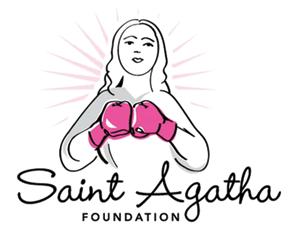
Laurie’s mission was to help “those who cannot afford their illness.” The St. Agatha Foundation is established with the National Philanthropic Trust in Pennsylvania, but focuses on the Central New York region, partnering with local hospitals and agencies to provide financial support to breast cancer patients.
Her mother took over as president of the foundation after Laurie died in 2009 at the age of 41. Laurie left her estate to the St. Agatha Foundation, and her parents have made significant financial contributions to support their daughter’s vision.
Breast cancer is one of the most common cancers among women in New York State and each year more than 15,000 women are diagnosed and nearly 2,600 pass away from the disease, according to the St. Agatha Foundation. Approximately 150 men are also diagnosed with breast cancer yearly in New York State. “The economic impact to breast cancer patients and their families can be devastating,” according to the organization.
In 2021, the Saint Agatha Foundation assisted more than 640 patients and their families by providing grants to hospitals and organizations in seven counties. During the past decade, the foundation has provided financial assistance to more than 7,035 breast cancer patients through more than $13.5 million in grants to local hospitals and partner organizations. SWM
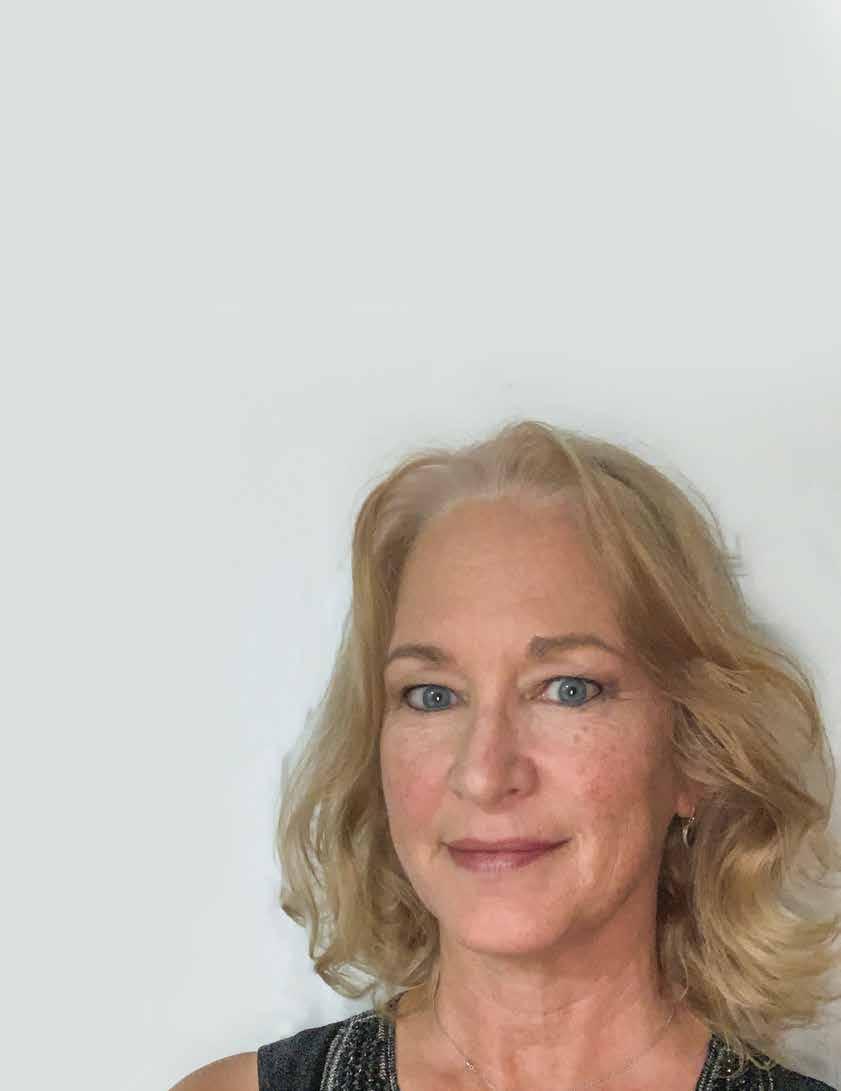 Dr. Kathleen Novicki, DPT, PRPC
Dr. Kathleen Novicki, DPT, PRPC
Fellow “thriver" here. It’s cancer: shock followed by a whirlwind of everything focused on survival. Surgery, chemotherapy, radiation, etc., etc. It's all about beating it. Thanks to many women before us, our five-year survival is better than ever for all cancers. When our battle is won, we are left battered and bruised and congratulated on our survival. But we don’t want to be just survivors; we want to be like we were before! We want to be back to our thriving lives but are left to handle the aftermath on our own.
We thank our doctors for saving us but where do we turn to help us with the pain, the lymphedema, the weakness, the painful intercourse, the fatigue and cognitive changes, the osteoporosis, the cardiac and lung issues? I recommend reaching out to your local physical therapist. They are in the business of helping you not only survive cancer but to thrive during and after treatment.
I am a retired physical therapist. I learned to self-advocate for referral to physical therapy as my oncology doctors were not aware of physical therapy’s supportive role in cancer treatment. Physical therapists (PTs) are movement experts. Physical therapists create treatment plans that help cancer survivors during and after treatment to manage the side effects of treatment and cancer-related problems. They improve quality of life through hands-on care, patient education and prescribed movement.
I want to share just two instances during and after my cancer treatment to highlight how a physical therapist may provide support. During treatment, as I was driving to visit a friend, I noticed a mild but acutely painful and tight swelling in my lower arm. Of course, my first thought was, “Has my cancer spread?” I checked with my oncologist who confirmed it was not cancer but did not make any recommendations. I then called a physical therapist who treats lymphedema (swelling in the arms and legs) and she recommended that I do a virtual visit with her.
Through that visit with a physical therapist I found out I had the beginnings of lymphedema, a common side effect of breast cancer treatment. Since it was not full-blown lymphedema, my doctor dismissed it. Getting treatment for lymphedema is essential in the early stages. Once the lymph glands and skin are stretched by the swelling, it is harder to prevent it from reoccurring. My physical therapist instructed me in exercises, self-lymph massage, and a compression sleeve. I am fortunate that this early treatment has resulted in rarely occurring and very mild lymphedema no longer requiring a sleeve.
Two years after treatment, I noticed pain and limited motion in my shoulder while playing pickleball. At this point, I was only seeing my oncologist once per year. So I went to see an
orthopedic physical therapist. He evaluated my shoulder and noted the restriction was from post-radiation fibrosis over the area of the treated breast and armpit. The muscles that are used in pickleball run through and attach in the area that was radiated thereby restricting their movement. It is not unusual that tissue changes can continue to occur years after radiation treatment. Again, I was prescribed exercises and self-massage and I am now enjoying painfree pickleball!
You can locate a physical therapist by going to The PT Locator at https://www.choosept.com/. However, this directory is only if they are a member of the APTA organization. Many very qualified PTs do not join the APTA. Search local therapists first but if they do not have experience with your particular problem, then search for physical therapists that offer telehealth.
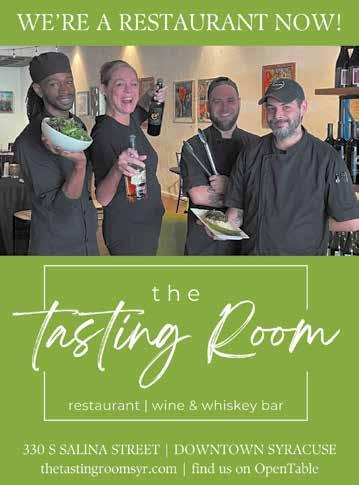



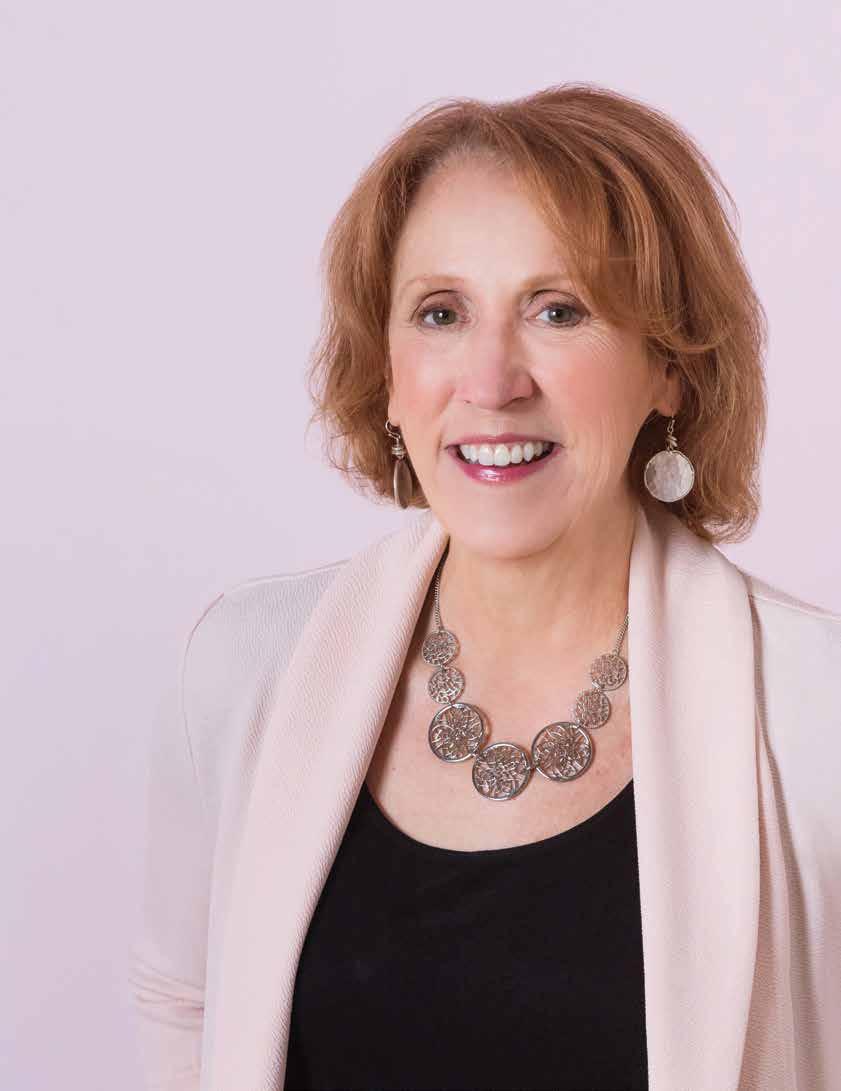
 Kate Hanzalik
Kate Hanzalik
Have you ever felt as if you don’t have a purpose? Have you ever felt like you’re not living up to your potential? Or maybe you’re content but you’re always open to growing and changing? If so, you’re like a lot of the people and companies Chris Allen coaches. As a workplace psychologist/ executive and team coach, and the president of Insight Business Works, she helps organizations become healthy in ways that are right for them. She assists them in finding purpose, improving communication, becoming more eco-conscious, more diverse and inclusive at the executive level, which helps companies and individuals thrive. Chris works with leaders to help them answer the question: “How can you show up in your integrity as your best self?”
“It’s really about helping the individual leader develop to a higher level and helping the team work better together. Ultimately things get done in life and our world through groups or teams working together to solve problems, not by one person being brilliant at solving a problem,” she said. “That’s what I love, that’s what I love to do.
Continued on page 24
I imagine I will always do it. I don’t envision myself ever retiring because my work makes me happy.”
As she explored her purpose, she went from pursuing her doctorate in psychology at Penn State University decades ago to private practice and directing a Women's Program as a private psychiatric hospital in Syracuse and serving as the president of the New York State Psychological Association, to founding her own business in 2011, where she now uses her skills and experience to make a broader impact.
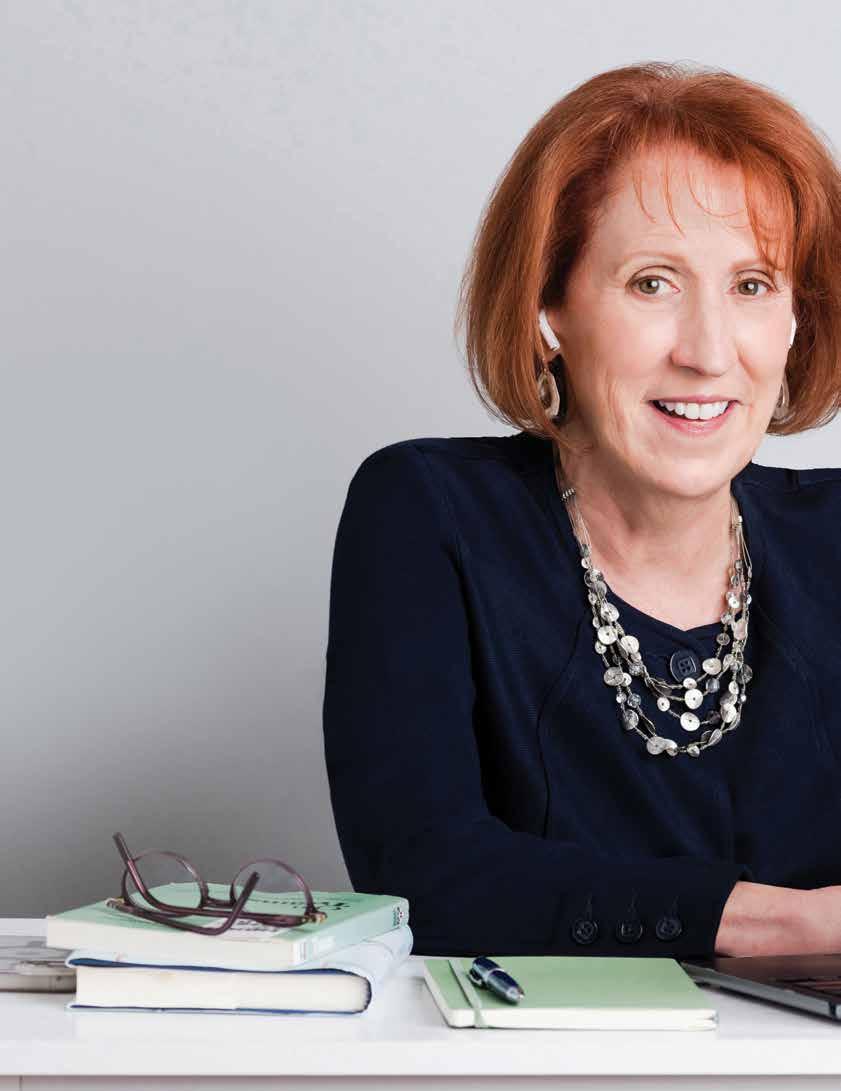
“I’m a psychologist, I’ll always be a psychologist, that does define me. Although I’ve always been focused on service and helping other people, for the last 15 years, as my kids have been older and [as] I’ve been able to travel more, I've wanted to have a broader impact on our world, to make a difference on a bigger scale. Doing whatever I can to leave the world and the planet better for my children, my children’s children, for everyone’s children’s children.”
According to Allen and other researchers in the field, our early experiences reveal our values and who we’ve always been; with that self-awareness, we can make the right decisions for ourselves. “For me, when I was 10, my mom could never find me because I was always up in a tree reading a book,” she said. “My mom was mad at me when she gave me three books for my birthday and I read them all on the same day. As long as you’re learning, it’s fuel.” Learning and growth are crucial to Allen living a fulfilling life, and so is connection.
"I've wanted to have a broader impact on our world, to make a difference on a bigger scale. Doing whatever I can to leave the world and the planet better for my children, my children’s children, for everyone’s children’s children.”
—Dr. Christine Allen
“I love to connect with people. My daughter teases me. I was just in a conversation [with a technology support specialist who was] helping with an email/computer problem, Nigel was his name. I always know the waiter’s name. I want to thank the person by their name.”
Importantly, Allen doesn’t spend her days dishing out advice, she’s committed to practicing what she preaches. “It’s not enough to be able to say [to clients], ‘Gee, you put exercise on your development plan, and how’s that going?’, if I’m not doing it.” So she exercises most days, but sometimes things get in the way, and that’s okay. She also has her own coach to help her on her journey as she believes in development and accountability. “

I also have a great husband who helps me to show up as my best self.” When she and her husband, Rob, moved to Syracuse more than 30 years ago, they bought an older house that needed renovating, which led to another challenge entirely. “We were doing work in the house, then in the middle of that, my husband, instead of helping with the wallpaper – he’s outside in the back digging a pond! And I’m like, ‘We need to rip up the carpets, we need to take down the wallpaper, we don’t really need to be digging a pond.’ I was really mad at him … now, the favorite part of my house? It’s sitting [by the pond] with the frogs, and the lily pads and the ferns … drinking a glass of wine, a cup of coffee, doing work, reading a book … I would have never prioritized making a pond. I would have prioritized, ‘Let’s get these big things done.’ That’s my personality. I’m
grateful because I’m married to somebody who is different from me and who has helped me … he’s kind of a free spirit, my husband.”
The couple met when they were at Penn State, Chris in graduate school and Rob as an older undergraduate who had served first in the military. Then, while she did her clinical internship at a psychiatric hospital in Syracuse, Rob finished college summa cum laude at Le Moyne College. The couple moved to Boston so he could pursue a law degree focused on public interest law at Northeastern University. Thereafter they returned to Syracuse, Chris as a psychologist and Rob a legal services attorney. They have stayed here ever since, raising two children and becoming part of the community.
Allen enjoys the big things in life, like savoring the moments when Rob makes her an expertly crafted cup of coffee in the morning and they simply talk. Moments like these matter, especially because they were diagnosed with cancer close to the same time; she is still being treated but will make a full recovery whereas his health is uncertain. She describes herself as the “poster child for early detection.” During the pandemic, she had an abnormal MRI, but nothing significant was found; then in 2022, her doctors did an ultrasound, a core needle biopsy, and eventually she had two surgeries. On the other hand, “My husband, he was supposed to get a physical in March 2020. Well, in March 2020 everything shut down and the doctor canceled … by the time he went for the physical in March 2021 … although he didn’t have any symptoms…[He was diagnosed with] advanced aggressive prostate cancer.”
They’ve taken care of each other, and so have their friends, as they live far from immediate family, who have shown up as their best selves to support them. “We have people here who are like family, who would do anything for us, who would just … I’m going to cry. Rob had just had this external and internal radiation, he was so fatigued, I broke my wrist and had to have surgery with a plate and seven screws, he was taking care of me, this was before I was diagnosed with cancer. And people would just ring the doorbell … and there would just be a whole meal on the porch that one of our friends would leave for us. It really means a lot.”
Continued on page 26
On living a purpose-filled life from page 25
Allen said her future is “still to be determined”: “I envision myself working less, hopefully being with my husband, my kids, I don’t know if they’ll have kids or not. Be with people I love.” Her daughter, Hannah, just started a PhD program at Penn State in applied linguistics. And her son, Tom, a virtual design construction engineer, lives in Colorado with his fiancé.
In regards to coaching, she said “I’m super excited about Micron coming and having [a] generation-changing impact on this community and hopefully promoting greater equity in this community, and I’d love to see how that evolves and develops,” adding that she and her team of coaches embrace collaboration over competition: “You don’t want people fighting over resources, you want people collaborating for the best outcome for the whole community. “
She’s also focused on the future of the planet. “Being here, seeing where my kids settle, the planet is an important stakeholder and it’s important to me to do eco-conscious consulting and coaching. So [I’m interested in] helping, when I work with a company. to think about their environmental impact, their relationship to the planet.”
As a cancer survivor, and someone who is thriving, she does have some advice for women: “You can’t show up the best for other people, whether it’s your employees, your children, if you’re always on the back burner and you never get around to [screenings]. And I can’t tell you how many women I have coached who have said, ‘Oh yeah, I need to get to that, I need to schedule my mammogram.’ I’m really good about doing those things. I know it’s been a scary time with Covid, but I think it’s really important for people to do the tests, to take care of themselves, and make time for those things,” she said adding, “I’m lucky. I’m lucky. I’m really lucky.” SWM

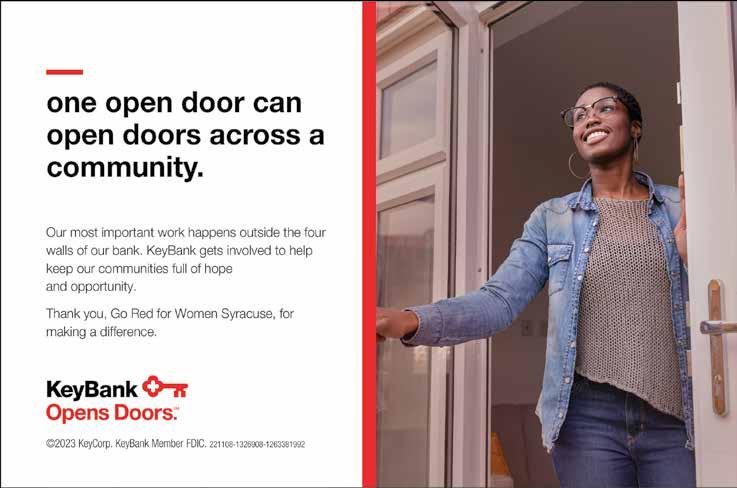
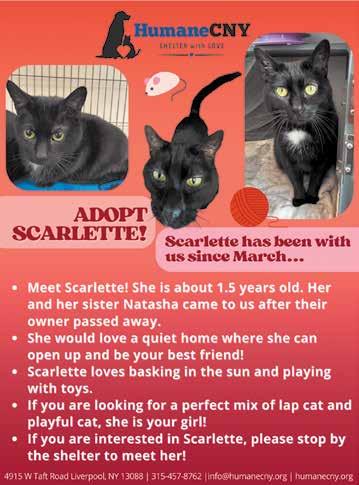
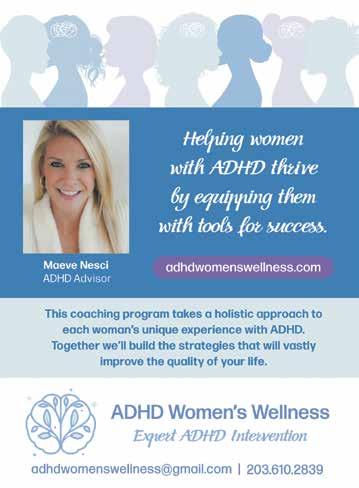

Cancer remains a formidable adversary, impacting countless lives annually, with women in the United States experiencing a substantial share of its burden. According to the American Cancer Society, an estimated 890,000 new cancer cases among women are expected in 2023. The fight against cancer takes many forms, and one of the most promising tactics is the food we choose to consume. In this article, we'll explore the potent connection between nutrition and cancer prevention, focusing on foods that can reduce the risk. We'll also dive into current healthy food trends and provide you with three delicious, cancer-fighting recipes, perfectly suited for the fall season.
Cancer is a complex and multifaceted disease, with women often confronting distinct challenges. Breast cancer, for instance, stands as the most prevalent cancer among women in the United States. The year 2023 is projected to see over 280,000 new cases of breast cancer alone. Beyond breast cancer, women also face other forms of the disease, such as ovarian, cervical, and uterine cancers. Acknowledging these statistics and proactively embracing prevention is pivotal for women's health.

While cancer's development hinges on a blend of genetic, lifestyle and environmental factors, our dietary choices significantly impact our risk levels. Research suggests that specific foods house compounds that can shield against cancer. Here are some cancer-fighting foods:
1. Cruciferous vegetables: Broccoli, cauliflower, Brussels sprouts and kale contain sulforaphane, a potent compound that may inhibit cancer cell growth.
2. Berries: Blueberries, strawberries, and raspberries are rich in antioxidants and phytochemicals, linked to reduced cancer risk.
3. Turmeric: Curcumin, found in turmeric, boasts antiinflammatory and antioxidant properties that may deter cancer cell growth.
4. Fatty fish: Salmon, mackerel, and sardines, abundant in omega-3 fatty acids, are associated with lower risks of several cancers, including breast and colorectal.
5. Leafy greens: Spinach, kale, and Swiss chard are packed with folate and fiber, which can safeguard against colon and breast cancer.
Now that we've identified foods that can lower cancer risk, let's explore ways to incorporate them into your everyday diet:
1. Start with a smoothie: Combine spinach, berries and turmeric with Greek yogurt for a nutrient-packed breakfast or snack.
2. Roasted veggies: Add various cruciferous vegetables to your dinner plate. Roast them with olive oil and your preferred spices for a flavorful side dish.
3. Salmon supper: Grill or bake salmon and serve it alongside sautéed kale for a cancer-fighting dinner.
As our comprehension of the link between nutrition and cancer prevention evolves, several healthy food trends have emerged to empower individuals in making informed dietary choices:
1. Plant-based diets: The popularity of plant-based diets including veganism and vegetarianism, is on the rise. These diets emphasize fruits, vegetables, legumes, and whole grains—foods associated with a lower cancer risk.
2. Anti-inflammatory eating: Inflammation is a known contributor to cancer development. Anti-inflammatory diets, abundant in foods like turmeric, ginger, and green tea, are gaining recognition for their potential cancer-prevention benefits.
3. Fermented foods: The gut microbiome's role in health, including cancer risk, is increasingly understood. Fermented foods such as yogurt, kimchi, and kefir support a healthy gut and may play a role in reducing cancer risk.
Continued on page 30
Food warriors from page 29

Serves 4
INGREDIENTS
1 tsp olive oil
½ cup green onion
4 tsp fresh ginger
1.5 tsp fresh garlic, minced
3 cups low sodium, fat free chicken broth
4 tsp red curry paste
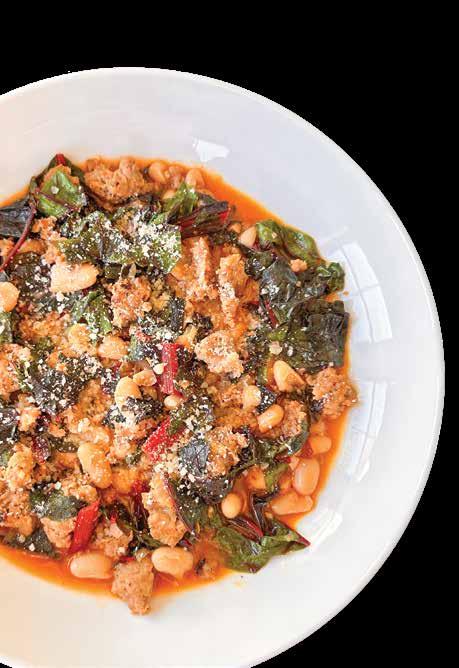
1 cup canned fire roasted diced tomatoes, drain liquid first
1 cup yellow bell pepper, chopped
1 cup orange bell pepper, chopped
1.5 lbs chicken breast, cooked
1 Tbs lime juice
¾ cup lite coconut milk
2 cups spiralized zucchini
½ cup fresh bean sprouts
1. In a soup pot, sauté onions in oil for a few minutes to soften.
2. Add ginger and garlic and cook until fragrant.
3. Add chicken broth and red curry paste and stir until combined.
4. Add tomatoes, peppers, and chicken and bring to a boil. Simmer 15 minutes.
5. Stir in lime juice, coconut milk, and zucchini at the very end and heat through for 3 to 5 minutes. Adjust seasoning with salt, pepper and a dash of your favorite hot sauce for some heat.
6. Serve with fresh bean sprouts on top.
Serves 4
INGREDIENTS:
2 garlic gloves (chopped)
1 bunch Swiss chard, stems and ribs removed and leaves roughly torn into 2-inch pieces
1 can Cannellini beans (drained and rinsed)
Finely grated zest and 1 Tbsp juice from one lemon (reserving extra juice for finishing dish)
1 tsp Dijon mustard
1 tsp smoked Spanish paprika
3 Tbsp olive oil (split)
16 ounces Italian sausage (link or crumble)
Finely grated Parmesan or Pecorino, to serve
DIRECTIONS:
1. In a large sauté pan or pot add one tablespoon of olive oil and sausage and cook until pink is gone.
2. Add garlic and sauté for a minute.
3. Add chard and cannellini beans and cook until the chard has cooked down. Season with a few pinches of salt and pepper.
4. In a small bowl, whisk together lemon juice and zest, Dijon mustard, smoked Spanish paprika, and olive oil. Pour into the pan and stir.
5. Finish dish with grated cheese and more lemon juice if desired.
“Don’t

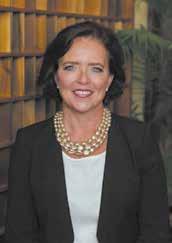





If you’re a newly diagnosed female with ADHD or strongly believe you have it, you’re not alone. In fact, percentage rates in adult female diagnoses have almost doubled in the past few years. Having adult ADHD in 2023 has become somewhat commonplace — in some cases, a self-diagnosis from a messy house and label courtesy of information gleaned from social media. In others, a doctor’s visit that explains years of frustration. There are several reasons why women with ADHD are (seemingly) everywhere.
With people spending most of their time in their homes during lockdown, with nothing to distract from symptoms that the busyness of their everyday lives helped to conceal, many individuals sought help for their feelings of distraction, disorganization and depression. For others, self-reflection over rooms full of unfinished projects, racing thoughts, extra screen time, and hours of hyperfocusing on a particular activity amounted to an eye-opening evaluation.
Conversely, since there are a handful of general symptoms commonly associated with ADHD and a variety of other labels, it is not always an exact science to diagnose someone and tease out the source of trouble. Conditions that mimic but are not limited to ADHD include depression, anxiety, PTSD and stress, bipolar disorder, addiction, oppositional defiant disorder, and sleep disorders, to name a few. To make things even more convoluted, it is not uncommon to have a comorbidity alongside your ADHD, such as one the previously named illnesses, making it easy to diagnose one and not the other.
An interesting phenomenon which has arisen in recent years is the adult female being diagnosed
alongside her child. It is not a unique situation for a mother to accompany her child to ADHD testing and resonate with the struggles voiced, leaving the appointment with not one, but two ADHD evaluations. In addition, an ADHD diagnosis may come as a direct result of motherhood, yet in a different way.
Some women who’ve struggled with ADHD starting from a young age, have managed to live and even thrive due to their years of imposed structures and routines from high school and college and a 9-to-5 job, only to collapse once children are born when the systems that enabled surviving and thriving are no longer in place and the demands of managing time for the individual herself and her family, becoming too much for a neurodivergent brain.
Historically, males have been easier to diagnose with ADHD before reaching adulthood as they commonly display the more obvious symptoms associated with ADHD, such as hyperactivity, whereas young women tend to present their ADHD through symptoms of distractibility and inattentiveness. Females are often better at masking their symptoms due to gender biases and societal norms, such as the desire to please and the feeling of shame over being different from their peers. Due to these differences, typically girls have flown under the radar more easily, and are historically overlooked and understudied until more recently.
Aside from going on medication, many diagnosed women seek therapy to navigate the journey in healing from their past conditioning. If their struggles were concealed, overlooked or misunderstood, they may have been perceived as lazy or lacking in intelligence. Oftentimes, women were the receivers of repercussions in school or at home for being forgetful, showing up late, or getting easily distracted.
Some women are not just relieved to receive a label of ADHD, but angry, as they have been been misunderstood for years, or in some cases, decades.

Focusing on diet and exercise can also be tremendously impactful in regulating ADHD. Eating food for better brain health can help with inflammation and prevent crashes in energy. Exercise, of course, can also be quite helpful, as the ADHD brain is constantly in a deficit of dopamine, and working out on a regular basis can prevent binge eating, over-shopping, and turning to other addictive behaviors.
Hiring an ADHD coach is another alternative to taking medication or may serve as a great addition to it. A coach can help you design tools which can be lifechanging in moving forward by identifying unhelpful thought and behavior patterns, and discovering what drives the unique way each individual’s ADHD shows up.
An ADHD coach may also assist in developing new skills regarding time management and accountability, transitions and cues, as well as initiating and sustaining effort with daily tasks.
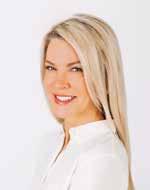
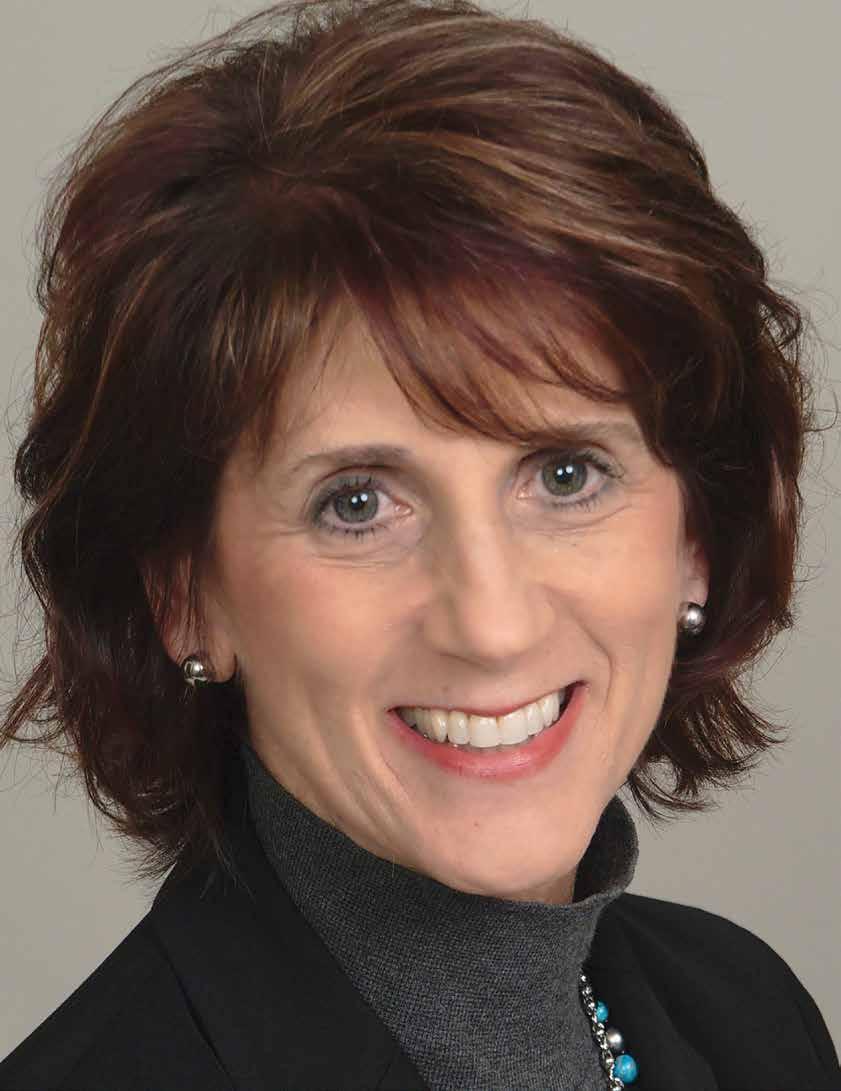
Rochele ‘Shelly’ Clark has been a nursing professional for four decades, earning several awards and helping to establish the first neuroscience service line at Crouse Hospital over the course of her career. She has found a fulfilling career working in nearly every major hospital in Syracuse, but when she was a young person trying to decide her future career path, she never expected to become a nursing professional.
“Back in the 80s, I wanted to be a teacher and my guidance counselor said, ‘There aren’t a lot of teaching jobs. What else would you like to do?’” Rochele laughed when asked about how she decided to pursue nursing, “I did have two older sisters who were nurses and so I think that was also a big influence. So I went into nursing. It wasn’t like it was a life-long dream, but it’s worked so well for me that I believe that it was a little bit of fate that’s got me there.”
Though becoming a nurse was a career choice seemingly chosen by fate, it was a career path that provided Rochele with many exciting opportunities.
“I spent the first half of my career doing a bunch of bedside nursing. And because my husband was in the military, I had an opportunity to move around and work in a lot of different institutions,” she said, when asked about how she was able to help with a variety of different projects. “So a lot of this experience was focused on either the emergency room or critical care nursing…Once I completed my degree, for me, becoming a stroke coordinator was like the fusion of everything I had done. It was a little bit of the emergency room, it was a little bit of critical care, it was a little bit of the neurology. I was able to tie it all together and at that point in my career I felt that as a bedside nurse, I was helping individuals, but I really wanted to establish programs that could help a large group of patients in a particular population.”
She joined Upstate at the time when developing a stroke center was a new concept. The first stroke center was established in New York City around 2003, she said, and Upstate was looking to become a designated stroke center by the New York State Department of Health.
“It was the fusion of my previous career, and so I applied to the position and then learned what it took to become a stroke center and put all of the policies and future processes in place in order to meet the requirements to receive that designation by the state,” she said. “Shortly after that was established in 2006, the whole idea of telemedicine came into play and so then – myself and my team – were instrumental in developing telemedicine for stroke. So, that way we would be able to reach into some of the more rural areas in our network that otherwise didn’t have access to the stroke specialists.”
Her work in telemedicine and her dedication to helping patients both became vital in the early days of the COVID-19 pandemic. As she was already immersed in the world of telemedicine, Rochele was already helping to establish telemedicine across the country. However, she also dedicated her time to working with patients on the front-line.
“At the time - this is before the pandemic hit - we were establishing telemedicine throughout the country. And I was already working remotely. My physicians worked in multiple states, our administrative team for the virtual practice worked in multiple states, and our hospitals weren’t different,” she said. “So we had already done this virtual sort of program. And then the pandemic hit. And as you know, when the pandemic first hit, the needs for many of our rural critical care – even some of our major hospitals for critical care physicians – was in dire need.”
Within two weeks during the beginning of the pandemic, Rochele and her team established telemedicine practices at 12 hospitals to ensure that clinical quality and access to critical care physicians could be maintained. That was her day job. Rochele also responded to a New York State hotline seeking licensed nurses to work at local facilities, so before hours she would work four or five hours in the morning on the actual COVID unit, taking care of patients who had been recently transferred from the hospitals to a Covid-only facility established by Loretto for patients who were moved from the hospitals but still Covid-positive.
“So I was actually working both sides of the COVID pandemic as a bedside nurse and in the virtual world trying to get as much access to hospitals throughout the country as possible,” she said.
In her 41st year in nursing, Rochele wants to find ways to encourage future nurses and those newer to the profession to make nursing their career as well.
“I’m still having a hard time letting go of that nurse identity,” she said about the prospect of retirement. “I feel that there’s still one more thing I have left and that’s to inspire new nurses coming on board, to realize that while it can be a very difficult career, and you read a lot about nurse burnout, there are so many different things that you can do to reinvent yourself and give back to the profession… Getting out of the profession is never going to help it. Staying in it, making changes, seeing the growth and evolution, that’s where we can actually make our biggest impact.”
But until she is ready to retire, Rochele plans to continue helping patients and encourage her younger peers. When asked about the most rewarding part of her career, she emphasized the power of medicine and what it really means to leave an impact, even after her direct involvement has ended.
“I always felt that the power of medicine, the power of nursing was to enable people to face health sustainably, to enable a program to health sustainability,” she said. “When I raised my kids, I always believed in that we give our children two things: one is roots, the other is wings. And I think that general philosophy in taking care of patients and taking care of or building programs was the same thing. I wanted to give strong foundations, I wanted to give my patients strong education and support. But then I wanted to give them the wings so they would be able to go on to maintain a full, happy life. I guess that was just my whole philosophy on life.” SWM
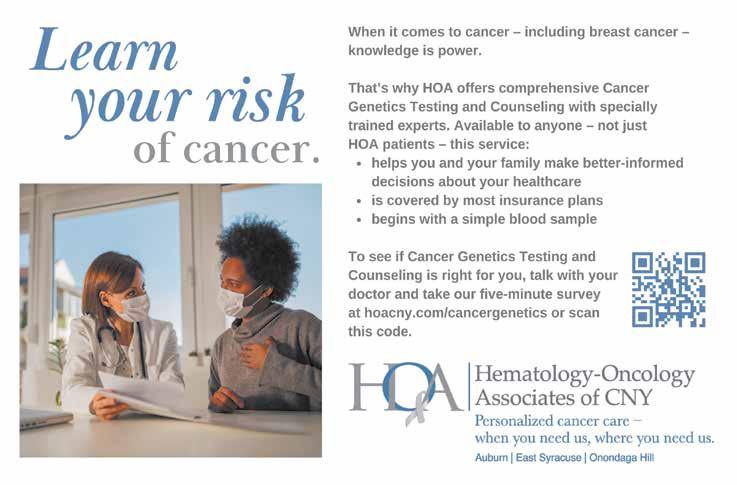
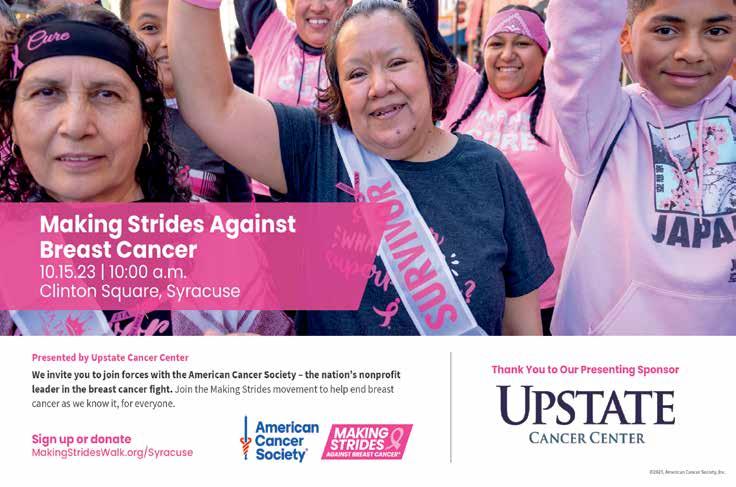



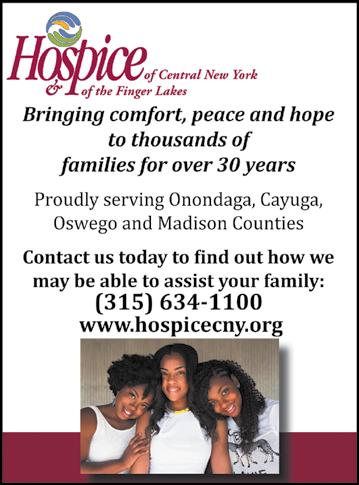

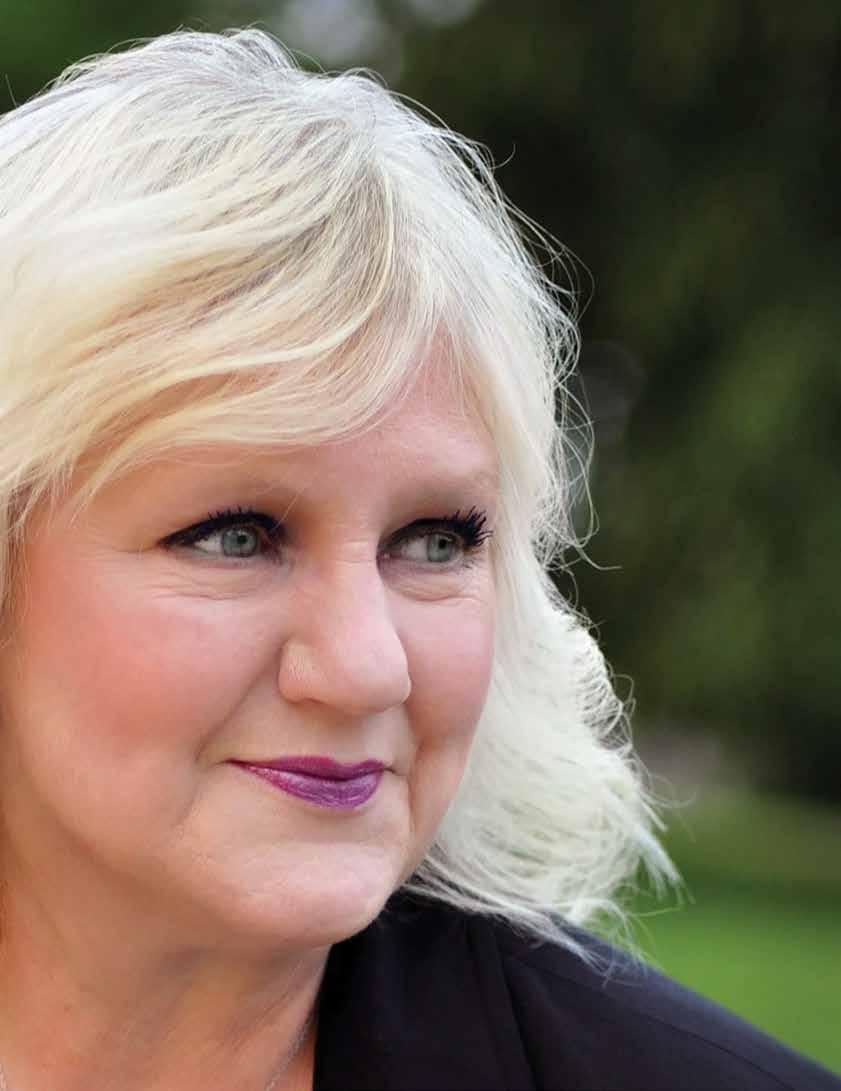
Shelley Skellington is a survivor in more ways than one. Her son, Joseph, was born with a rare blood disorder and a cleft palate. He spent a lot of time in the hospital throughout his childhood. “I would cry on many occasions for the obstacles Joseph had to face with surgeries on his cleft palate, ear surgeries, and the blood disorder,” Shelley said. Through this, Joseph’s strength kept Shelley strong. “He would say, ‘Mama it's going to be alright. We are strong,’ She shared.
Despite Joseph’s conditions, he remained happy and positive and would light up a room wherever he went. His teachers loved him because he was so polite and respectful. In 2017, Joseph was diagnosed with AML Leukemia. In September 2019, Shelley lost Joseph to Leukemia when he was 29 years old.
Shelley admits that the grieving process has been difficult. After losing Joseph, she experienced depression and anxiety for the first time in her life. She shared how she seeks comfort. As she went through the initial loss of her son, Hospice in Liverpool was a very good outlet for her.
She explained that for the first three years after Joseph passed, she had a bereavement counselor. Then she retired leaving Shelley feeling like she lost someone important to her again.
“I had to learn to build a support network of people who have also lost a child. I reached out to friends who were willing to listen. Most of all, I want to keep my son's memory alive,” Shelley offered. She keeps and cherishes her son’s belongings. One that is particularly special is one of the notes that Joseph wrote to her. “He called me his Wonder Woman because I was a single mother. He would write me letters saying what a great mom I was to him. I carry one of the little notes he wrote telling me that I am a wonderful mother and how much he loves and cherishes me,” she shared.
“As a mother who is scared for their child's health when your child is a shining light with such a positive outlook, all you can do is fight harder,” Shelley learned.
Shelley also heals through helping others. She recently gifted Joseph’s Taylor Swift collection to a young man battling cancer. It was rewarding for Shelley to make such a generous gesture making someone happy, while carrying on Joseph’s memory.
Her family has been a great support system for her, including her husband, Rick, who loved Joseph. She shares how close they were with the same goofy humor and kindness.
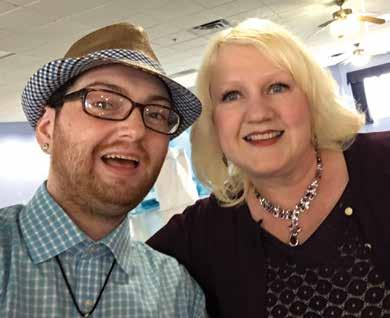
Joseph's youngest sister, Maya, is also one of her support systems in dealing with the loss of Joseph. They often reminisce about the good times, the laughter, and the crazy fun stuff they all did together.
“Maya misses her older brother very much because he understood her and appreciated her as his little sister,” Shelley explained.
After she graduated from Oswego State University with a degree in psychology, Shelley pursued a career in human services working with individuals with chronic health and mental health conditions. She did this for about a decade before working with refugees and immigrants, along with advocating for language services for limited English proficiency individuals.
“My whole life, even as a child, I always wanted to help the underdog,” she shared.
Shelley has been instrumental in collaborating with legal services to assist individuals in the naturalization process. She connected people to services in their community, so they could live happy, healthy lives.
She also connected homeless people to housing and other services.
Currently, Shelley works for Elite Home Health Care as a community outreach representative connecting people to homecare. “Elite has allowed me to work at a place of employment that appreciates what I do and the connections I make. I feel alive again after working daunting jobs that sucked the life out of me and where I was considered just another number,” Shelley shared. She explains that you have to be in a good place after losing a child. Her manager at Elite recently sent her care package with sunflower items, which was her son's favorite flower, along with a card recognizing how hard September is for her.
Helping people while connecting them to home care makes Shelley feel good. She helps people battling cancer and she feels she can relate to what they are going through. She appreciates being able to help them.
Shelley received the award of an advocate of the year for Nosotros Gala Hispanic Heritage Month in 2017 for advocating for language access for the Latino Community and setting the precedence of the obligation to interpretation. She became involved in the Latino community teaching Cuban Salsa Dance lessons for 10 years. Joseph would help her teach lessons and was also an avid salsa dancer.
Shelley was recently appointed as a commissioner on the Onondaga Human Rights Commission by Mayor Ben Walsh. She will be an advocate for language access and work with the commission to better serve the Syracuse community.
Shelley survives through the inspiration Joseph has always been to her and everyone in his life. “I read cards that people sent to him during his journey of Leukemia,” she said. “They all talk about how wonderful of a person he was and the kindness he gave to them. He was a very inspirational person.” SWM



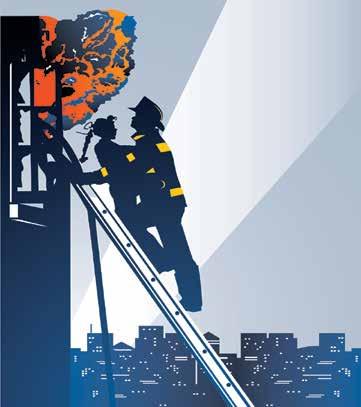

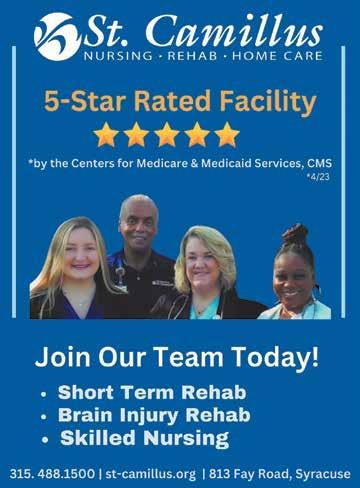
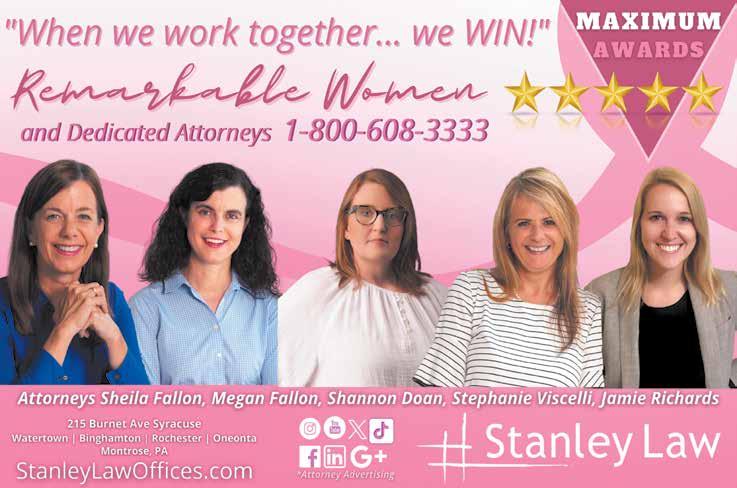





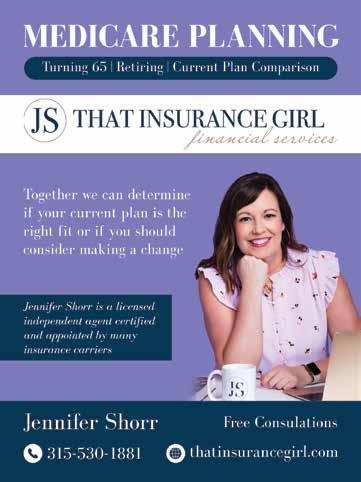

Michele Diecuch of Syracuse, has accepted the role of executive director of Leadership Greater Syracuse.
Diecuch previously worked as the senior director of programs with ProLiteracy Worldwide, where she spent 25 years serving in a series of progressively higher leadership roles. She had oversight of membership programs, fundraising, marketing and promotions, community outreach, and people management functions.
“Michele has deep experience in, and passion for, the nonprofit sector, with a strong knowledge of the sector's needs, challenges, and opportunities; and is a respected national thought leader. Further, she exemplifies LGS’s values,” said LGS Board President Amy Lawler.
Diecuch has worked directly with grantors and corporate funders and has extensive experience executing events and programs. Further, she serves as a current board member of LiteracyCNY, a long-standing nonprofit adult literacy organization in Syracuse and has also served as the vice president of National Coalition for Literacy, the leading adult education advocacy organization in the U.S.
“With a 37 percent increase in applications for our flagship program and the launch of a new program with Syracuse University, Diecuch has the skills, attitude and aptitude LGS needs to sustain and grow our business,” said Lawler.
“As a lifelong and deep-rooted Syracusan, I am looking forward to this new opportunity to focus my efforts in my hometown,” Diecuch said. “LGS is an amazing organization that does life-changing work. I feel honored to be able to impact folks in the community by building on the strong foundation and mission of LGS.”
As Central New York-based Strategic Communications continues to grow, the public relations agency has hired Leah Deming Jaworski as public relations content specialist.
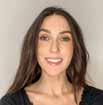
Deming Jaworski is a digital public relations professional with almost a decade of experience in the industry. Most recently, she served as a senior digital marketing manager and people lead at Terakeet, where she managed a team of 12 digital outreach specialists and wrote content for clients in the healthcare, finance, lifestyle, and wellness industries. She also previously held the role of digital marketing manager at Trainor Associates. She earned her bachelor’s degree in public relations from Utica College of Syracuse University (now known as Utica University).
“Leah is a strategic thinker with a passion for developing creative content and campaigns that drive brand awareness and results for clients,” said company
President Crystal DeStefano. “We are excited to have Leah join the team and look forward to the value her expertise will bring to our clients.”
“I’m thrilled to join the talented team at Strategic Communications, where I will have the opportunity to leverage my creative and strategic mindset to bring value to both the company and clients,” Deming Jaworski said.
In her new role, Leah will write content for a variety of mediums, including press releases, media pitches, blog posts, website content, interview talking points, speeches, and social media posts. She will also provide public relations coordination for Strategic Communications clients, including assisting with media outreach activities and project management.

Katherine Lowe recently joined ACR Health as the director of development and community engagement. In this role, Lowe oversees the organization’s fundraising and outreach efforts throughout its nine-county service area. She returns to fundraising after a 10-year hiatus in which she became a chef focusing on senior nutrition and a restaurant owner.
Before her venture into the culinary field, Lowe enjoyed a successful 15-year career in fundraising, public relations and non-profit management in Syracuse and Washington, DC area, working for organizations such as Capital Hospice and Robert Wood Johnson Foundation funded Last Acts Partnership.
She holds a bachelor of arts degree in political science from Wells College and a bachelor of science degree in hotel, resort and tourism management from Paul Smith’s College.
Senator John W. Mannion recently honored Me’Shae Brooks-Rolling, executive director of the Upstate Minority Economic Alliance (UMEA), for her commitment to advancing inclusive entrepreneurship in Central New York.
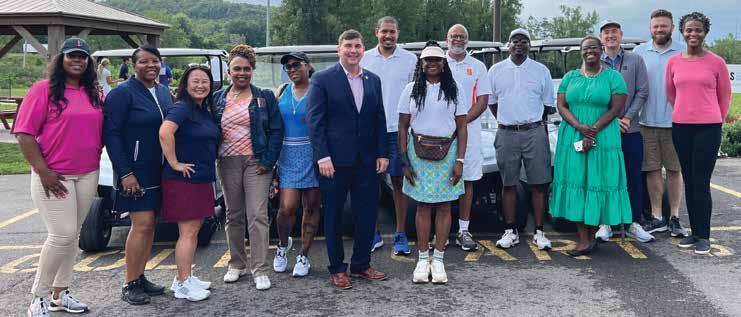
“Me’Shae Brooks-Rolling is a pillar and asset in the Central New York region that countless local businesses depend on,” Mannion said.
“She has dedicated her career to helping minority-owned businesses grow and succeed, and she has made a real difference in our community. I am proud to honor her with this official commendation award on behalf of the New York State Senate.”
Brooks-Rolling has been executive director of UMEA since 2020. UMEA is a non-profit organization that helps minority-owned businesses grow and expand. The organization provides technical assistance, financial support and networking opportunities to minority-owned businesses.
Brooks-Rolling has more than 25 years of experience in the hospitality and special events industry. She is a certified personal finance educator and the author of a book on financial empowerment for women. She is also a member of numerous boards and commissions, including the Onondaga Community College Foundation Board of Directors, On Point for College, and the WISE Women’s Business Center.
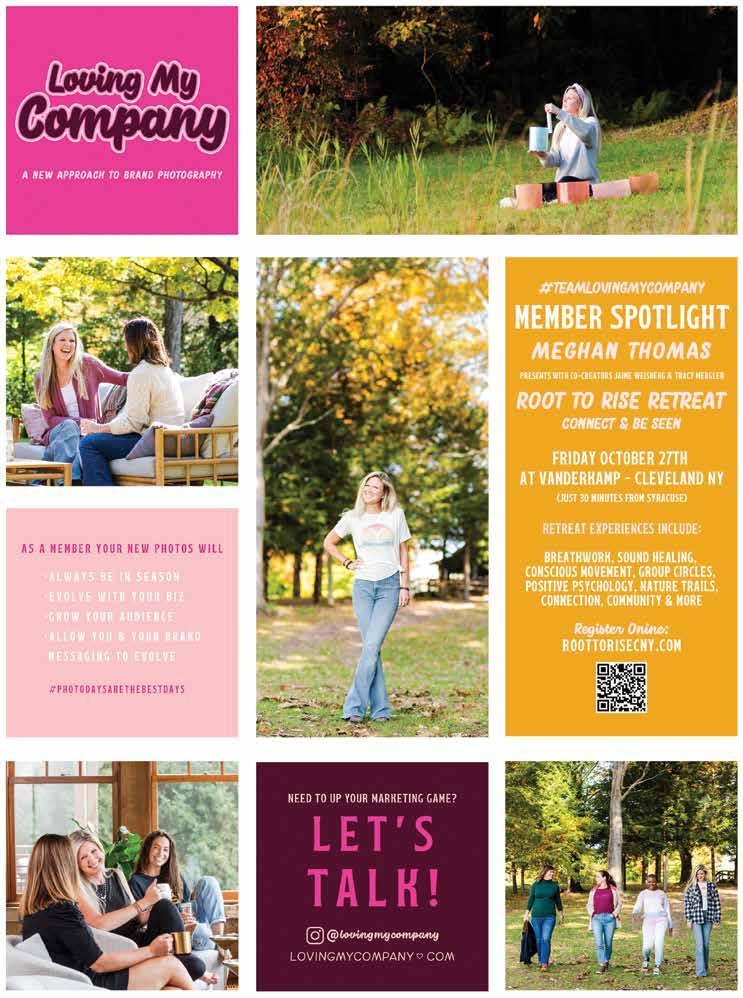
October 4
Wine Release Party
What: Learn about CNY wineries and five wines with with a perfectly paired cheese/charcuterie board.
Where: The Tasting Room at Epicuse, 330 S. Salina St., Syracuse

When: Doors open at 5 p.m., tasting begins at 6 p.m.
October 6-8
St. Joseph’s College of Nursing



125th Anniversary
What: The college will host a weekend of exciting events to celebrate its long legacy of nursing education.
Where: St. Joseph's College of Nursing,
206 Prospect Ave, Syracuse, NY 13203
Info: sjhcon.edu/125-anniversary
October 6
Syracuse Style Fashion Show
What: Runway show featuring local boutiques and designers, sponsored by The Treasury, Goldwell NY, Lancome, Clinique to benefit The Food Bank of CNY
Where: The Treasury, 101 S. Salina St, Syracuse NY 13202
When: 8 p.m.
Info: Tickets available at cnytix.com
October 10 & 12
Wills & Trusts Seminar
What: Attorneys from Bousquet and Holstein will help participants discover how trusts can protect their assets and secure their families’ futures.

Where: Oct. 10, 9 to 11 a.m.: The Craftsman Inn & Suites,
7300 E Genesee St, Fayetteville, NY 13066
Oct. 12, 3 to 5 p.m.: Hampton Inn & Suites Syracuse North Airport
1305 Buckley Rd, Syracuse, NY 13212
Info: bhlawpllc.com/event/trusts-seminar

October 11
There’s No Place Like Home 2023
What: The largest annual fundraiser, featuring a variety of refreshments, silent auction items and the chance to unlock “house doors” to win wonderful prizes. Where: Exposition Center, NYS Fairgrounds,
581 State Fair Blvd. Syracuse, NY 13209
When: 5:30 to 8:30 p.m.
Info: francishouseny.org

October 13-15
Country Folk Art Craft Show
What: Shop from a variety of arts, crafts and gifts.
Where: New York State Fairgrounds,
581 State Fair Blvd. Syracuse, NY 13209
Info: https://www.countryfolkart.com
October 15
Making Strides Against Breast Cancer
What: Join forces to help end breast cancer.
Where: Clinton Square, Downtown Syracuse,
161 Genesee St, Syracuse, NY 13202
When: 10 a.m.
Info: https://www.upstate.edu/specialevents/making-strides-against breast-cancer.php
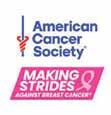
October 18
CNY Women’s Network Monthly Mingle
What: A casual pop-up networking event for all. Only pay for your drinks and food.
Where: Pressroom Pub, 220 Herald Pl, Syracuse, NY 13202
When: 4:30 p.m. to 7 p.m.
Info: Free.
October 20
Candlelight Concert: A Haunted Evening of Halloween Classics

What: Discover Halloween-inspired music under the gentle glow of candlelight. Where: The Palace Theater, 2384 James St, Syracuse, NY 13206
When: 6:30 p.m. and 9 p.m.
Info: https://feverup.com/en/syracuse/candlelight.
October 21
Syracuse Hard Cider and Doughnut Fall Fest

What: Part bar hop, part sweet celebration! Featuring four bars, restaurants, live Djs, beer, cider, and doughnuts. Where: Historic Armory Square District, 400 S. Franklin St. Syracuse, NY 13202
When: 2 to 8 p.m.
Info: 21+. Purchase tickets at eventbrite.com/e/syracuse-hard-cider-doughnut fall-fest-tickets-706222028097.
October 24
Go Red for Women Luncheon
What: Be The Beat with the American Heart Association at the 2023 Go Red For Women Luncheon.

Where: The OnCenter Nicholas J. Pirro Convention Center, 800 S State St, Syracuse, NY 13202
When: 10:30 a.m. to 1:30 p.m. Info: syracusegored.heart.org
October 26
Night Lab: Space Exploration
What: Join for happy hour, hors d’ouevres, ExploraDome and a screening of "Alien."
Where: The Milton J. Rubenstein Museum of Science & Technology, 500 S Franklin St, Syracuse, NY 13202
When: 6 p.m.
Info: $20. For more information, visit www.most.org/nightlab/.
October 27
Rocky Horror (Interactive) Picture Show
What: Come dressed for a costume contest, raffle,cash
prizes, live band, themed drinks and food trucks. Where: The Palace Theater, 2384 James St, Syracuse, NY 13206
When: Doors open at 5:30 p.m. Band at 6:30 p.m. Movie starts at 9:30 p.m.
Info: 18+. There will be sprayed water, thrown objects and loud noise.
October 28
Halloween Farmers Market
What: Enjoy trick or treating, a kids’ coloring station, costume contests, and more.

Where: CNY Regional Market, 2100 Park St, Syracuse, NY 13208
When: 7 a.m. to 2 p.m.
